
REVISITINGS INSTITUTE OF POLICY STUDIES CELEBRATING 35 YEARS 1988 2023 Analysis Bridge-Building Communication
The Institute of Policy Studies (IPS) was established in 1988 as an independent think tank to study and generate public policy ideas in Singapore. IPS became an autonomous research centre of the Lee Kuan Yew School of Public Policy at the National University of Singapore in 2008. Today, IPS continues to analyse public policy, build bridges between thought leaders, and communicate its findings to a wide audience. The Institute examines issues of critical national interest across a variety of fields, and studies the attitudes and aspirations of Singaporeans through surveys of public perception. It adopts a multi-disciplinary approach in its analyses and takes the long-term view in its strategic deliberation and research.

Foreword by Director
35 Years at a Glance
Our Genesis
Reflections by Special Adviser
Research Agenda
Key Events Tiding through
Contents Celebrating 35 Years (1988-2023)
REVISITINGS: Away from the traditional format of annual reports, “Revisitings” presents a journal and archive of IPS’ operational years, with special emphasis on key research projects and events of the past five years. It is centred on photos and graphics of pertinent events, supplemented with reflections of colleagues from the research and administration departments of the Institute.
Uncertainty
Influence
People A Network of Corporate Associates Thank You to Our Donors 02 04 12 18 20 36 48 54 66 76 78 REVISITINGS Institute of Policy Studies
Casting
Our
by Director
Ten years ago, on our 25th anniversary, IPS numbered 31. Now, on our 35th anniversary, we number 114 — an almost four-fold growth.

In 2013, we had barely started IPS Social Lab, which collects sentiments data. Now, Social Lab alone exceeds 45.
Ten years ago, we did not have IPS Policy Lab, which conducts pilots and policy experiments. Policy Lab is beginning to do interesting work — with the support, among others, of The Ngee Ann Kongsi and the Tote Board — with eight research staff.
Together with Social Lab and Policy Lab, the expertise and knowledge of the Society and Culture department and the Governance and Economy department have continued to grow and deepen over the years. They focus on four areas of research: Managing Diversities; Inequality and Social Mobility; Managing the Challenges and Opportunities of an Ageing Society; and Governance of a City-State.
Policy research remains our foundation: examining policy; discussing policy; publishing on policy; conducting surveys on various matters pertinent to policy issues; and providing platforms for a wide variety of stakeholders to meet on policy — like conferences, seminars, workshops, citizen juries, deliberative polling, and what not.
With Policy Lab, we are moving in a new direction — not only researching and talking about policy, but also experimenting with policy, running pilots, figuring out what might work, what doesn’t.
We are admittedly at the foothills in this area. There is a great deal more we can do — in government as well as research institutions devoted to studying various aspects of government — in adopting an empirical approach to policy-making, testing proposals before they are scaled up, and building a body of knowledge on policy implementation and outcomes, with the view of improving them and thus improving the lives of our fellow citizens. Over the next decade, all this will become an increasingly more important part of the work at IPS.
And that brings me to the fundamental point: IPS is only as good as it is useful to our stakeholders. There is no other reason for it to exist. So our mission is simple: Make ourselves as useful as possible.
If I may give an example of the kind of work we are very proud of: IPS researchers, working with a grant from the Social Service Research Centre at NUS, spent three years studying the living and working conditions of platform or gig workers. Our young researchers — research assistants and research associates — were very enthusiastic and involved in this project. As a result of their effort, IPS made a contribution to government efforts to improve the working conditions of platform workers.
This is only one example of the useful work we can do. It is not just a matter of producing research papers, as valuable as those are. It is also about mobilising the passion and idealism of young researchers to improve policy — to make life just a little better for our fellow Singaporeans.
Will IPS still be around in 10, 20 or 50 years? Well, if we remain of use to the public service, to the government and to the people of Singapore, there is no reason why we should not be around. And if we cease to be of use, there is no reason why we should exist.
I am confident we have built a sufficiently strong foundation to ensure a future filled with impactful research leading to positive change.
Janadas Devan IPS Director
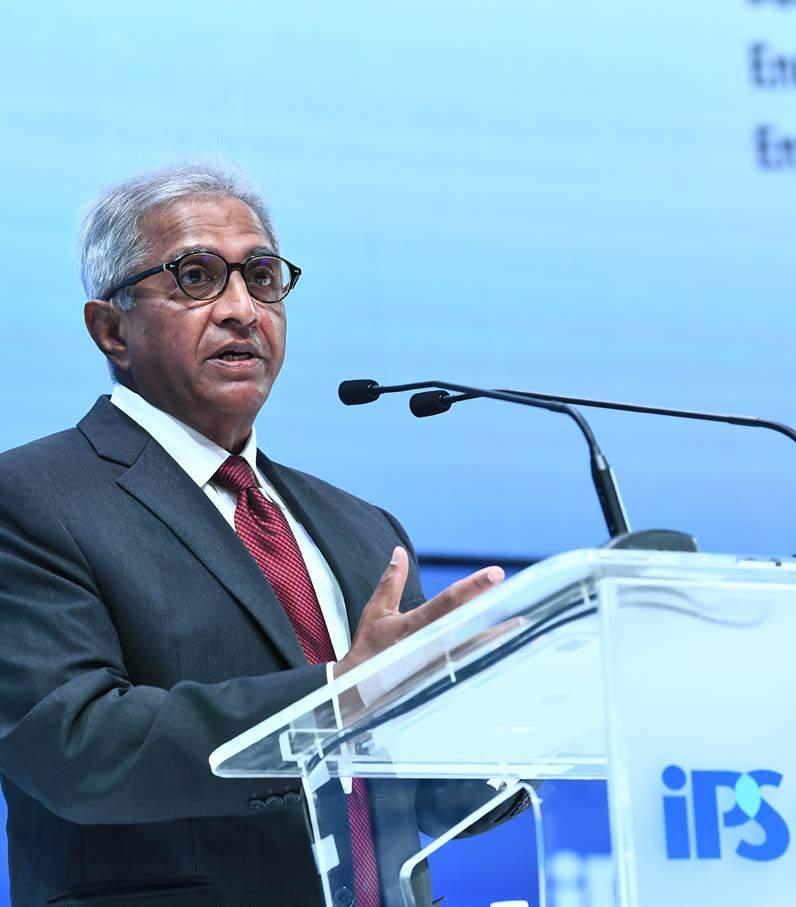
FOREWORD BY DIRECTOR
Institute of Policy Studies REVISITINGS 03 Celebrating 35 Years (1988–2023) 02
Foreword
35 Years at a Glance
1993
1991
IPS-ISEASSIIA Lecture
1988
Establishment of IPS
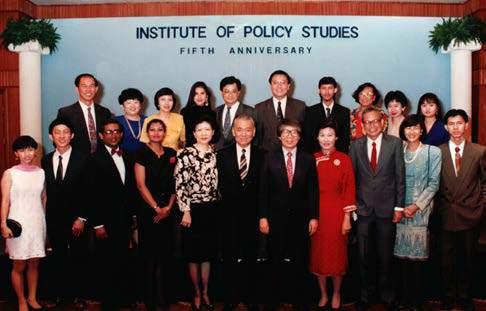
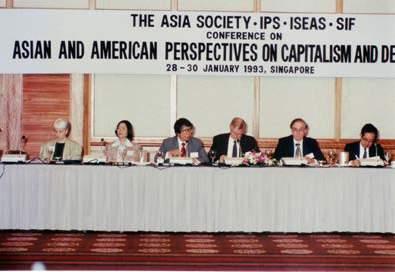
1991
Inaugural Year in Review
1988
First Public Lecture
Collaboration with the renowned Asia Society (US)

1992
5th Anniversary and Launch of the Corporate Associates (CA) Programme
1993
First Young Singaporeans Conference (YSC)
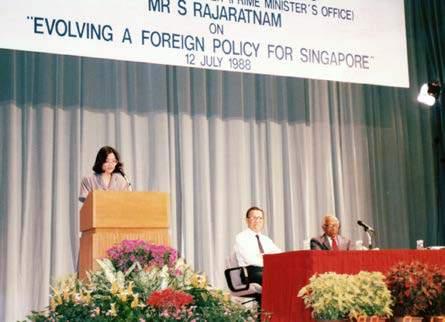
35 YEARS AT A GLANCE
Institute of Policy Studies REVISITINGS Celebrating 35 Years (1988–2023) 05 04
IPS-UNITAR-Japan Collaboration
APEC Pacific Business Forum
First Japan-Singapore Symposium
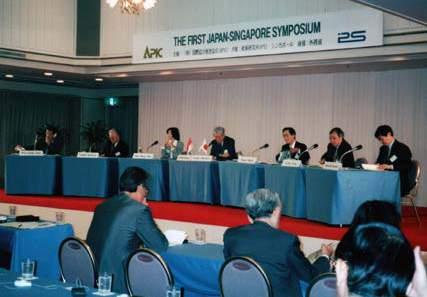
World Conference on Model Cities

Launch of the Singapore Economic Roundtable
10th Anniversary
Launch of Singapore Perspectives
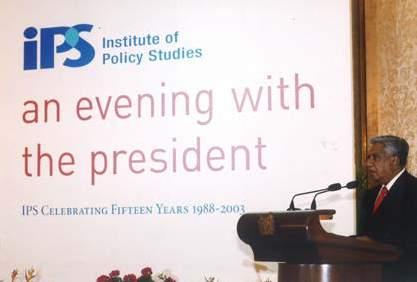
15th Anniversary
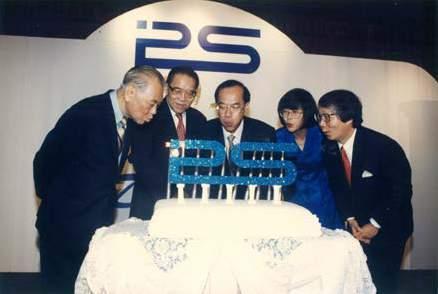
1994 1994 1995 1999 2003 2003 2000 1997
35 YEARS AT A GLANCE Institute of Policy Studies REVISITINGS Celebrating 35 Years (1988–2023) 07 06
2007 Nobel Laureate Lectures
2008
20th Anniversary
2013

25th Anniversary and Establishment of IPS Social Lab
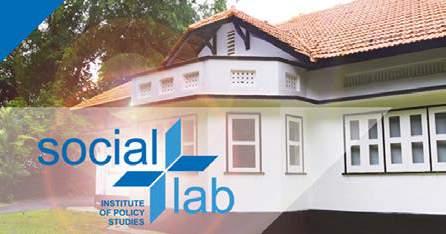
2007
Merger with the Lee Kuan Yew School of Public Policy and Relocation to Cluny Road
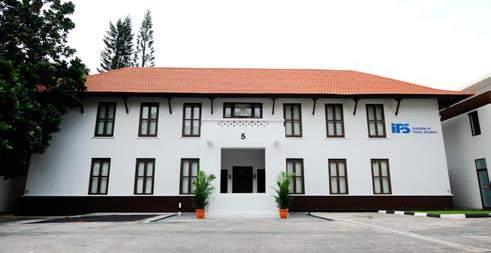
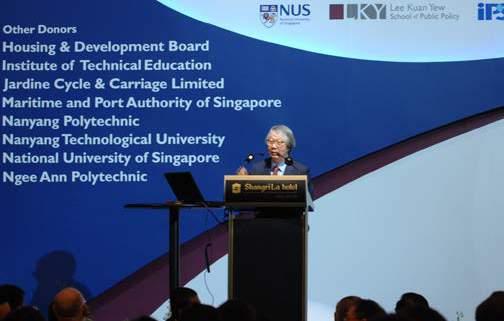
2014
Inaugural S R Nathan Fellowship Lecture Series
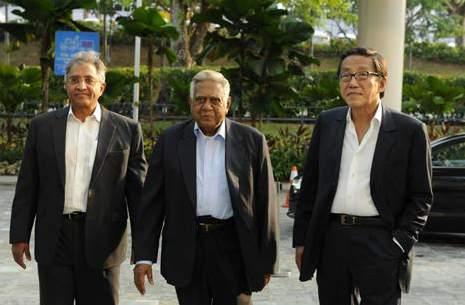
35 YEARS AT A GLANCE Institute of Policy Studies REVISITINGS Celebrating 35 Years (1988–2023) 09 08
Continued expansion, with a projected number of 120 personnel this year
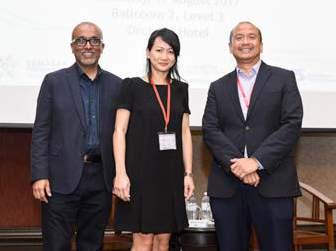
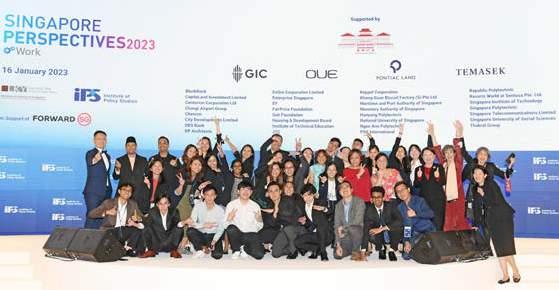
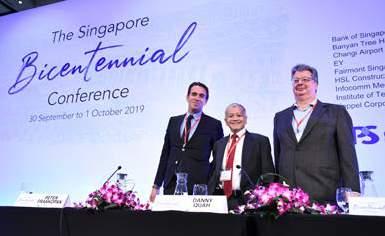
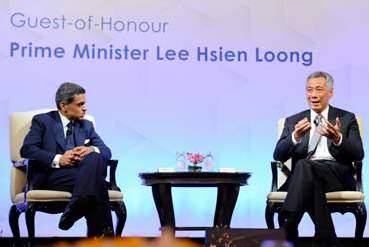

2021
Establishment of Policy Lab 2023
30th
of
2015 2015 2019
SG50+
Launch
2017 2018
35 YEARS AT A GLANCE Institute of Policy Studies REVISITINGS Celebrating 35 Years (1988–2023) 11 10
Anniversary and Reorganisation
IPS
2020
Conference
of Singapore Chronicles The Singapore Bicentennial Conference Launch of IPS Online series
Assigned Host of the Asia Journalism Fellowship
OUR GENESIS
THE INSTITUTE OF POLICY STUDIES WAS ESTABLISHED IN 1988 TO PROMOTE AN INDEPTH UNDERSTANDING OF THE FUNDAMENTALS OF PUBLIC POLICIES AND TO OFFER A PLATFORM FOR THE EXCHANGE OF IDEAS ON ISSUES IMPORTANT TO SINGAPORE.

OUR GENESIS
Institute of Policy Studies REVISITINGS Celebrating 35 Years (1988–2023) 13 12
Our Genesis,
with Goh Chok Tong
We look at the conception of the Institute of Policy Studies (IPS) in 1988, with reference to IPS’ Founding Patron, Emeritus Senior Minister (ESM) Mr Goh Chok Tong’s recorded interview from the IPS Oral History archives.
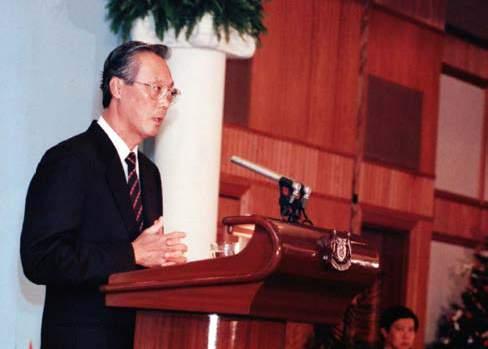
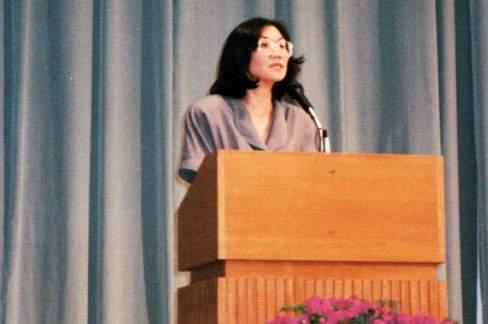

It is difficult to understand the genesis of IPS without taking in Mr Goh Chok Tong’s point of view. This is not to say that others were not involved in its establishment, but that the conception of IPS began largely with Mr Goh, when he started with the idea of a heritage study centre. It had struck him that he was amidst a dearth of local awareness about Singapore’s history — including knowledge about the “fight against communism, against communalism” in the past, and Singapore’s independence. A place like the Political Studies Centre he attended as a young civil servant, he thought, could help educate and inform.
“I thought we should know the history of Singapore, before... [we] can consider the future of Singapore,”
Mr Goh Chok Tong, on record for the IPS Oral History project, 7 August 2020.
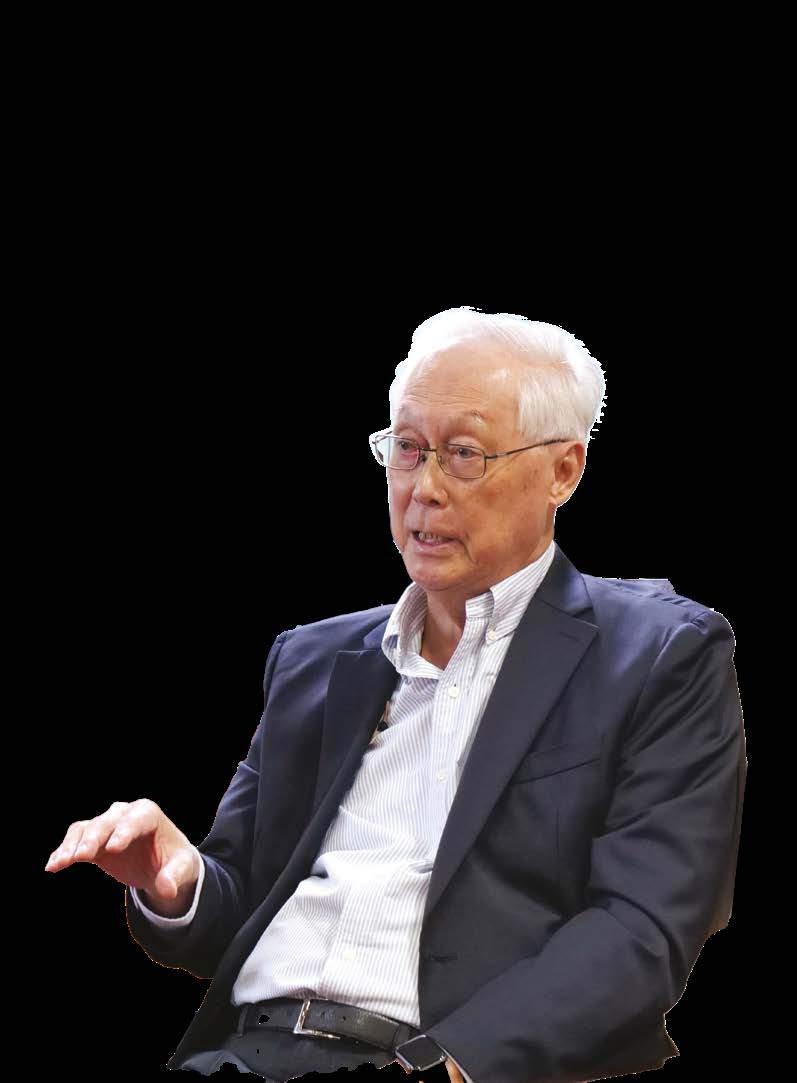
OUR GENESIS
Prof Chan Heng Chee, IPS’ Founding Director, speaking at IPS’ First Lecture with S Rajaratnam, 1988.
Mr Goh Chok Tong speaking at IPS’ 5th anniversary, 1993.
Institute of Policy Studies REVISITINGS 15 Celebrating 35 years (1988-2023) 14
But Mr Goh also wanted a place similar to the Brookings Institution, an American think-tank conducting research largely in economics and policy, because he had viewed Brookings as future-centric. He felt that a policy studies centre could more completely engage in both considerations of the past and future.
With the striving for such dual perspective combined with independence from the government, he had aspired for IPS to be made of people “looking in from the outside”, more freely able to determine the gaps, especially between ministries. Back then, ministries had all been working “in silos”, although problems were, in their reality, “national, cross-ministry problems”. He had hoped that new ideas could be harvested “before the government spotted them”. Also, these ideas need not necessarily be only political ideas, but could relate to arts, culture and environmental issues.
“I was hoping IPS would … see certain things which we were not seeing in the government.”
Mr Goh Chok Tong, on record for the IPS Oral History project, 7 August 2020.
And so it was on 15 January 1988 that the setting up of IPS was announced by Mr Goh when he was then First Deputy Prime Minister and Minister for Defence. To maintain IPS’ autonomy, it was thought best that he be Founding Patron, rather than Chairman. Prof Chan Heng Chee, who was the head of the Political Science Department at the National University of Singapore, was to be IPS’ first Director.
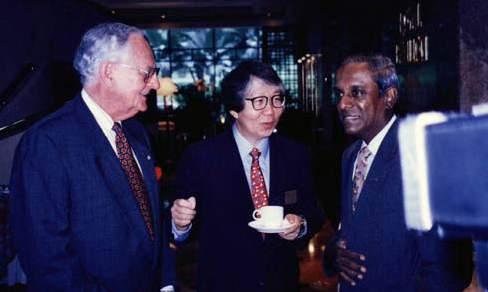
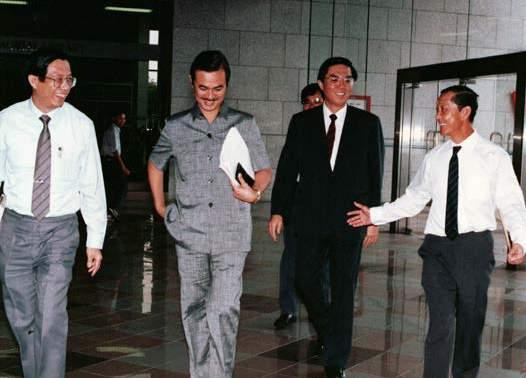

In Mr Goh’s speech at IPS’ grand opening, IPS’ intended function and place in Singapore were clearly articulated.
“The Institute will have two major roles. Apart from imparting to the younger Singaporeans in public administration and managerial positions in the private sector a good knowledge of Singapore’s history, it will also provide a forum to stimulate lively discussions on Singapore’s future.
Younger Singaporeans want to play a role in shaping Singapore’s destiny. This is healthy. We should encourage it. There was no regular forum for them to go to if they wanted to contribute their ideas, or to express their dissenting views. The Institute will provide a regular forum for them. They can brainstorm their ideas freely, frankly and without fear. It is a place where they can disagree agreeably. The Institute will also undertake research studies. Properly run, the Institute will provide valuable input into the decision-making process of Government thinking.”
Mr Goh Chok Tong, announcing the establishment of IPS at the Opening of the Hon Sui Sen Memorial Library where IPS will be housed, on 15 January 1988.
Accordingly, dialogue would go on to be two-way, with the support of Singapore’s political leadership enabling IPS to carry out its programmes and attract highcalibre speakers and participants interested in stimulating discussions. Office holders often participated in IPS events to offer their perspectives on the changing strategic environment in Singapore, and alternative views were then simultaneously conveyed constructively to policymakers.
OUR GENESIS
Lee Kuan Yew (left) at the Asia-Europe Forum organised by Asia-Europe Foundation and IPS, and Herbert Quandt Stiftung, 1998.
Prof Jon Quah (left), Acting Director from 1988-1990, at the IPS Public Lecture with Datuk Abdullah bin Haji Ahmad Badawi (second from left), then-Vice President of UMNO Malaysia, 1989.
Institute of Policy Studies REVISITINGS Celebrating 35 Years (1988–2023) 17 16
Prof Tommy Koh (centre), IPS’ Director from 1990-1997 and 2000-2004, at the IPS-IMO (International Maritime Organization) International Conference, 1996.
Reflections by

Special Adviser
Happy birthday IPS.
When you are busy, time passes very quickly. Thirty-three years have passed since I returned from Washington, D.C.. One of the first Singapore leaders who invited me to lunch was our Patron, Mr Goh Chok Tong. He was then Deputy Prime Minister and Minister of Defence. It was not a free lunch. He asked me to be the Director of the Institute of Policy Studies (IPS).
I have spent many years of my life working at IPS, twice as director and once, as chairman. I love IPS and regard it as one of my institutional babies. I am very proud of its achievements during the past 35 years.
Looking to the future, I have given thought to what the work of IPS should focus on. It should seek to preserve and protect some of our most precious achievements, such as meritocracy, no corruption, racial and religious harmony, multiculturalism, free trade and free economy, gender equality, care for nature and environment.
At the same time, IPS should study some of the challenges to Singapore’s unity, cohesion and fairness, such as poverty, inequality, an ageing population, identity politics, and attempts by foreign countries to influence and manipulate our public opinion.
Singapore has been extraordinarily successful. To remain successful, we must understand more fully the revolutionary changes taking place in the world and their impact on Singapore. The revolutionary changes I refer to include the biotechnology revolution, the digital revolution, robotics revolution and Artificial Intelligence revolution. Singapore has to constantly reinvent itself to seize the new opportunities and to look after the casualties of these revolutions.
There is also another task for IPS, which is to broaden the space in Singapore for intellectuals and artists. We must strengthen the culture of accepting disagreements. No one must be stigmatised because he or she disagrees with the government. The contestation of ideas is an essential characteristic of democracies. And, contrary to what the Americans think, Singapore is a democracy.
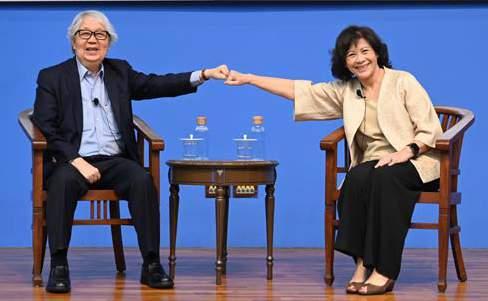 Tommy Koh Special Adviser Director (1990–1997), (2000–2004)
Tommy Koh Special Adviser Director (1990–1997), (2000–2004)
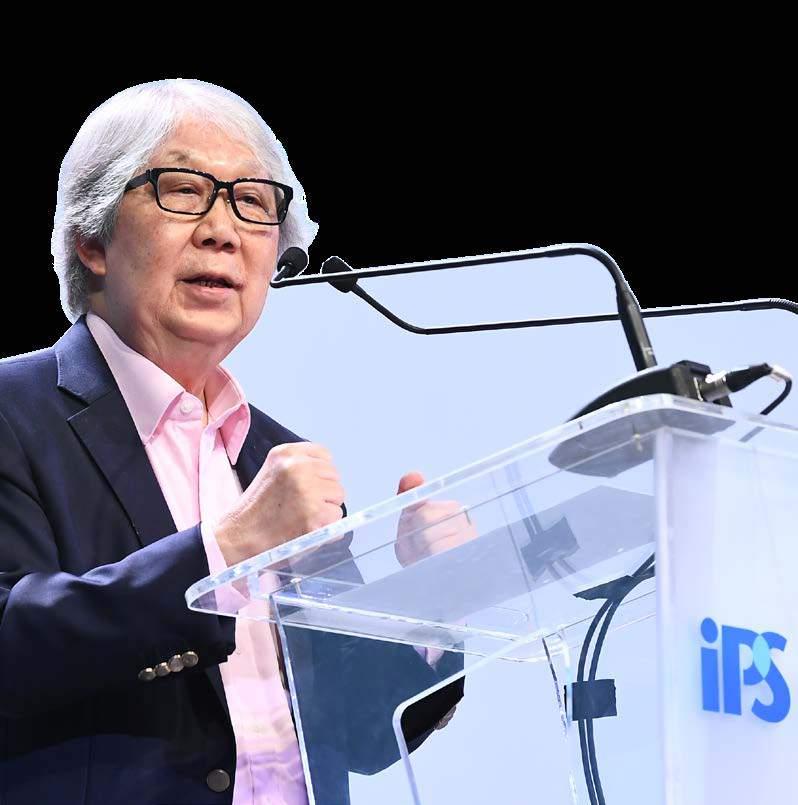
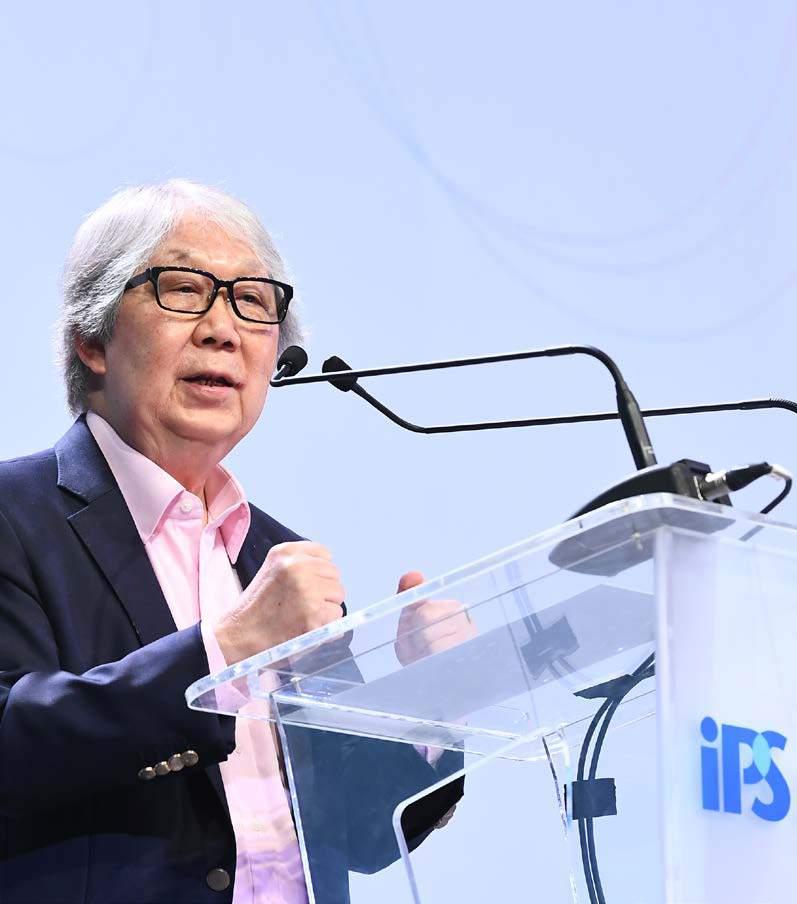
REFLECTIONS BY SPECIAL ADVISER
Prof Tommy Koh with 10th S R Nathan Fellow Dr Noeleen Heyzer. Prof Koh was the moderator for the Question-and-Answer segment of Dr Heyzer’s second lecture.
Institute of Policy Studies REVISITINGS 19 Celebrating 35 years (1988-2023) 18
RESEARCH AGENDA
RESEARCH AT IPS FOCUSES ON MANAGING DIVERSITIES; MANAGING THE CHALLENGES OF AN AGEING SOCIETY; INEQUALITY AND SOCIAL MOBILITY; AND GOVERNANCE OF A CITY-STATE. THESE RESEARCH AREAS ARE HELMED BY FOUR IPS RESEARCH DEPARTMENTS. NAMELY, THEY ARE GOVERNANCE AND ECONOMY, SOCIETY AND CULTURE, SOCIAL LAB, AND POLICY LAB.

RESEARCH AGENDA
Institute of Policy Studies REVISITINGS Celebrating 35 Years (1988–2023) 21 20
Central Research Programmes
The body of research at the Institute of Policy Studies (IPS) translates into action-based research, closed-door policy discussions, public forums, opinion essays and teaching curriculum. With projects observing one or more of the following central themes, they generate knowledge germane to the social, economic and political flourishing of Singapore today.
Managing the Challenges of an Ageing Society

Singapore has undergone a rapid demographic transition, from the high birth and death rates after the Second World War to our current low birth and death rates. Population policies have played and will continue to play a central role in the country’s development strategies, balancing the economy’s needs for workers with the management and integration of foreigners.
This research programme analyses the social and economic impact of Singapore’s ageing society, ultralow fertility, longer life and health expectancy, and migration. It examines changes to family structures, employment, entrepreneurship, productivity, savings and investment, and their policy implications.
Managing Diversities
Globalisation, access to digital technologies, the changing role of media and rising education levels in Singapore have led to more new and different identities, of gender, nationality, religion, race, class, education, family structure, sexual orientation and political ideology.
This research programme tracks our growing diversity and its implications for national identity, social cohesion and capital, community resilience and governance.


Governance of a City-State
Inequality and Social Mobility

Singapore is a uniquely successful small global city-state. Its size, location, history, diverse population and lack of natural resources present a unique challenge for governance.
General theories of political development and governance, economic development and business strategies, models of public sector management and diplomacy can neither adequately explain Singapore’s continued success, nor provide guidance for Singapore’s future development.

This research programme seeks out useful ideas and comparative experience that can be realistically applied or creatively adapted to help policymakers in the key sectors of the country build towards sustainable economic and social vibrancy.
Inequality and social mobility are separate but related challenges for any society. Studies of the former can reflect differences in circumstance such as uneven access to resources, while the latter portrays the permeating level of fairness, justice and equity. At present, there are studies of developments in both, with consideration of measures to limit negative trends such as social stratification that can have implications on social stability, well-being and cohesion.
RESEARCH AGENDA
RESEARCH AGENDA
Institute of Policy Studies REVISITINGS Celebrating 35 Years (1988–2023) 23 22
Governance and Economy
Headed by Senior Research Fellow Christopher Gee, the IPS Governance and Economy department is centrally interested in researching economic and fiscal impacts of ageing; human capital and industry transformation; governance of a city-state; migration and integration; and social capital, cohesion and inclusion.
One study published by Governance and Economy is the Leaving Well: End-of Life Policies in Singapore project in 2019, which considers what is needed to help Singaporeans die well and according to their preferences. With Singapore’s ageing demographic and their hundreds of thousands of family members, many will soon have to contend with the complex issue that is the end of life, along with the potential gap between preferences and reality.
The report also looked at ways in which end-of-life care can be better integrated with long-term and primary care services so that patients’ needs and preferences are more consistently met throughout their interactions with the healthcare system. Questioned is the under-resourcing of the palliative care sector compared to hospitals and tertiary institutions.
Another example of a project led by Governance and Economy is the inaugural Asia Voices: Perspectives on Tax Policies seminar in 2022. Held on Zoom with academics, business leaders and policymakers from public and private sectors in the region, the focus of the presentations and discussions was the intergovernmental Organisation for Economic Co-Operation and Development (OECD)’s Global Anti-Base Erosion Model Rules (GloBE Pillar Two) and their impact on the role of tax incentives in economic development in Asia. For context, these Pillar Two model rules are published by OECD to address tax challenges derived from the digitalisation and globalisation of the economy, and are agreed by 137 countries in 2021 under the OECD/G20 Inclusive Framework.
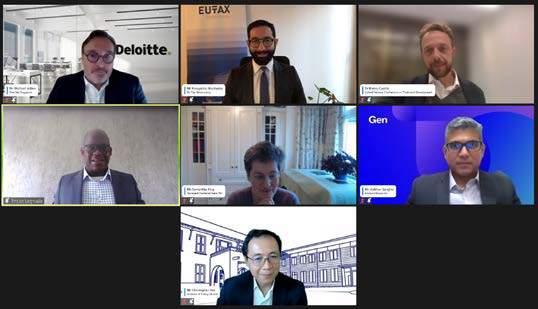
As such, part of what was addressed in the Asia Voices seminar were insights on the principle of vertical equity as a theoretical aspect of international tax policy, how GloBE rules practically relate to Asia, and discussions raised in the context of competing GloBE objectives and principles based around the idea of a developing Asia.
Reimagining Singapore 2030 is a scenario-planning project that aims to engage the public in re-perceiving our future in year 2030 given the effects of the pandemic, pre-existing trends and other emerging trends.


Reimagining Singapore 2030
“How will we achieve happiness, prosperity and progress for our nation in 2030 and beyond?”
of Singaporeans wish to die at home 77% of deaths take place at hospitals 63% actually die at home 24% occur at nursing homes, charitable institutions and sick receiving houses 11% Lien Foundation survey in 2014 Estimated Number of Singaporeans aged 75 and above by 2050 200,200 2018 2050 926,000 PROJECTION 200, 000 400, 000 600, 000 800, 000 1,000, 000
RESEARCH AGENDA
Mr Christopher Gee in the midst of a discussion with speakers at the Asia Voices: Perspectives on Tax Policies seminar, 2022.
Institute of Policy Studies REVISITINGS Celebrating 35 Years (1988–2023) 25 24
“The Governance and Economy department has always worked on high level, macro, nationally representative surveys of public perception and perspectives. But over the last five years, what we’ve done is to go down a notch and look at community-level governance problems, and do more public engagement in the community or for selected targeted groups such as the elderly. This is to get a sensing of the ground for areas where the one-size-fits-all approach may not work and where national level policies may not necessarily apply its fullest. An example was to look at specific issues within the ageing population, such as the mobility of older persons and employment opportunities for older workers.”
- Mr Christopher Gee, Senior Research Fellow, Head of Governance and Economy
A new project that the department is looking to launch is the Social Compact Outcomes Fund. The fund will support innovative social impact projects in Singapore in an experiment to investigate new funding models that incorporate Outcomes-Based Financing principles. It aims to crowd-in non-traditional sources of capital to fund social impact projects that would not otherwise be funded. There is also a goal of establishing and maintaining a database of performance and evaluation metrics to help shape cost-benefit analyses for social projects.
“This is where we’re working with the social services ecosystem at large trying to rope in like-minded partners to see how we can shift the sector’s orientation from just looking at outputs and inputs to measuring the outcomes from interventions that are being done. This will help us with policy experimentation and to see what works. This is a big change from what we’ve been doing before. We’re actually rolling up our sleeves and getting our hands dirty,” said Mr Gee.

Society and Culture
Led by Principal Research Fellow Dr Carol Soon, the Society and Culture department studies issues relating to technology and society; employment and work in communities; the Malay-Muslim community; public engagement and deliberation; implementation evaluation; and the Asia Journalism Fellowship.
IPS Study on Singaporeans and False Information
In response to the dissemination of “fake news” on myriad topics, including the economy, health, international relations and domestic politics, the study was conducted in three phases and examined three aspects of the local relationship with false information, which are susceptibility, immunity and intervention.
Key findings on the aspect of susceptibility included a possible age and class divide in terms of information and digital literacy among Singaporeans, a generally low digital and information literacy locally, and the need for a more balanced information diet to reduce confirmation bias in consumers of media.
6 10
in have encountered and believed false information in the form of text or images
They were more likely to be more susceptible to false information
MEDIA
Seniors Living in one- to three-room Housing Board flats
MEDIA
Lower levels of knowledge about the media and information landscape
Another project helmed by the Society and Culture department is the Research Network on Malay/Muslim Issues in Singapore established in 2018. Through workshops, closed-door discussions, interest groups and a group for action, the network aims to connect researchers and advocates who are invested in addressing issues faced by the local Malay-Muslim community by sharing and implementing actionable practices.

RESEARCH AGENDA
Solve Complex Problems Develop the Impact Ecosystem Evaluate Evidence and Shape Policy Institute of Policy Studies REVISITINGS Celebrating 35 Years (1988–2023) 27 26
This pioneering IPS SCOF has three key objectives for society, the ecosystem and policy
By bringing together academics, policymakers and community leaders, and generating research findings with implications for policy and practice, the network seeks to raise the general well-being of the Singapore Malay-Muslim community.
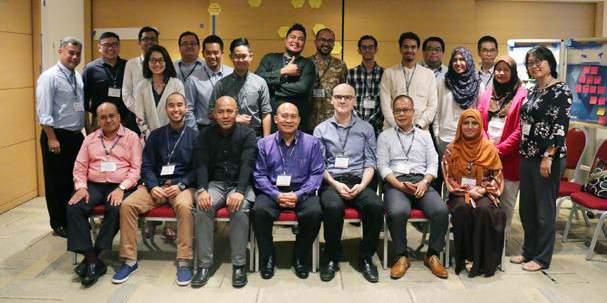
Citizens’ Panels
Since 2017, IPS has worked with different agencies on citizens’ panels. They include the Citizens’ Jury on the War on Diabetes (2017), Recycle Right Citizens’ Workgroup (2019) and Citizens’ Panel on Work-Life Harmony (2019). The Ngee Ann Kongsi has also funded citizens’ panels on youth mental health and employment resilience in 2022 and 2023 respectively.
“In different countries, citizens are becoming more involved in governance. Besides giving feedback to their government on policies and programmes, citizens are stepping up to do more in different ways — some work with government agencies and community leaders to co-create solutions for the problems they face, some work with agencies and community leaders to co-implement solutions, and some take the lead and provide solutions on their own. The citizens’ panel is one way to involve citizens in co-governance.
In a citizens’ panel, people from different walks of life work closely with one another to consider how we can as a society solve the problems that Singapore face.
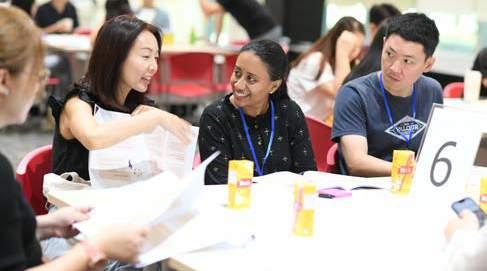
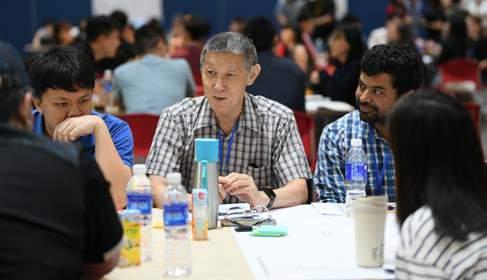
The outcomes of each citizens’ panel are a testament of the value of citizen participation in the policymaking process. Besides contributing policy solutions, participants can better understand what it takes to overcome individual differences and realise a collective purpose,” said Dr Carol Soon.
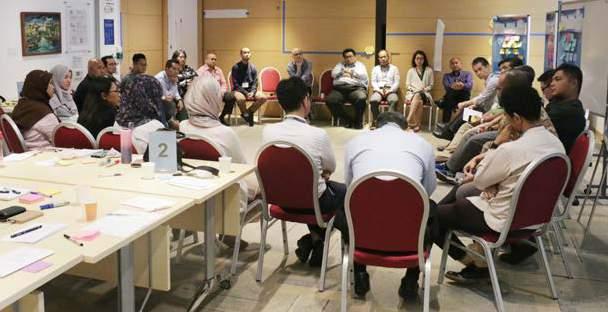
“In the past few years, the department has both broadened and deepened its research in various policy domains to inform policy and practice. For instance, in the area of media and technology, we have gone beyond studying the impact of technology on society and communities to the role of technology in work and employment. Employment is an integral part of one’s identity and progression in society. Colleagues’ research focuses on the intersection of employment issues and vulnerable communities.
In addition to sensemaking through research to inform policy and practice, the department has also embarked on public engagement projects for policy solutioning. These engagement initiatives like the citizens’ panel involve key stakeholders such as policy beneficiaries and partners to co-develop policy solutions. Another exciting development is the department growing its work in implementation research, which examines what policy works for whom and under what conditions, beginning with the healthcare sector. ”
- Dr Carol Soon, Principal Research Fellow, Head of Society and Culture
RESEARCH AGENDA
Participants from a diverse range of backgrounds working on policy proposals together at The Ngee Ann Kongsi-IPS Citizens’ Panel on Employment Resilience, 2023.
Institute of Policy Studies REVISITINGS Celebrating 35 Years (1988–2023) 29 28
Social Lab
The Social Lab, led by Principal Research Fellow Dr Mathew Mathews, is a centre for social indicators research at IPS. Established in 2013, Social Lab conducts research on social perceptions, attitudes and behaviours in Singapore using the most robust standards in survey methodology and statistical analyses. Researchers also collect and analyse panel data to complement cross-sectional and time-series data. Significantly, Social Lab has leveraged population-based online survey experiments since 2021 to establish causal relationships between variables of interests while maintaining external validity of the survey design.
Population-based Survey Experiments
Social Lab constantly experiments with new research capabilities for generating policy insights. One of the most incisive tools is the use of population-based online surveys. This involves the use of survey experiments, including gamification and interactive designs for immersivity, which are carefully embedded within large-N surveys conducted online. Through population-based survey experiments, researchers are able to establish causal relationships between variables of interests, and more importantly, maintain the external validity of the survey design. The use of gamification tools embedded within survey experiments also allow researchers to investigate respondents’ attitudes and opinions more accurately, with less response bias particularly in surveys on sensitive topics.
One study helmed by Social Lab is the Singapore Panel Study on Social Dynamics (SPSSD). Since 2014, Social Lab has been conducting a longitudinal study of up to 5,000 households, or up to 10,000 individuals, as representation of the Singapore population. Over time, the study tracks changes to the lives of the same people. The point is to measure family dynamics, societal values and attitudes relevant to national identity and social mobility over an extended period. So far, six waves of data have been collected.
Singapore Panel Study On Social Dynamics (SPSSD)
The stress of heading a household appeared to be greater among those living in public housing

Youth Study on Transitions and Evolving Pathways in Singapore (Youth STEPS)
This research study is the first national long-term research conducted on youth in Singapore. The National Youth Council and IPS have been following over 3000 youths since 2017 to study their life experiences, and factors that contributed to their educational/career pathways and trajectories.
3 5
in faced uncertainty over employment or career prospect in 2020
CNA-IPS Survey on Race Relations
CNA-IPS Survey on Race Relations
The 2021 wave of the CNA-IPS Survey on Race Relations re-examines issues of race that were initially probed in the 2016 edition of the survey.
The 2021 wave of the CNA-IPS Survey on Race Relations re-examines issues of race that were initially probed in the 2016 edition. It also asks new questions on race-related topics that have become more prominent since then, such as the preference for tenants of the same race.
It also asks new questions on race-related topics that have become more prominent since then.
Respondents’ Racial Preferences in Political Representation
The study began with a panel of respondents from households in Singapore in Wave 1
... and those with lower educational qualifications
Another example of their work is a series of reports on the COVID-19 pandemic, with data drawn from an online survey panel of over 2,000 respondents, about 500 of whom were polled in each wave since April 2020. In the report, The COVID-19 Pandemic in Singapore, One Year on: Population Attitudes and Sentiments, the attitudes of Singaporeans towards social and economic issues were examined, including that of psychological well-being, concerns about cost of living and perceptions towards medical workers.
Marriage could be perceived as a greater matter of concern by women compared to men. Younger respondents might face more di culty making sustained transitions out of financial inadequacy than older respondents
Household heads living with their parents reported the lowest levels of personal life satisfaction Single women Less likely than single men to believe that marriage leads to happiness Single men Top reason for postponing marriage was not having met a suitable partner
5,002
Private
HDB up to 3 rooms
Housing
Postgraduate Primary VS VS
RESEARCH AGENDA
40% 100% 20212016 20212016 20212016 20212016 20212016 20212016 20% 0% Singaporean Chinese To be the Prime Minister of Singapore To be the President of Singapore Singaporean Malay Singaporean Indian 60% 80% Singaporean Chinese Singaporean Malay Singaporean Indian 40% 100% 20% 0% 60% 80% 21-35 years old 36 50 years old 51 65 years old Above 65 years old Racism
Views on the Problem of Racism by Respondents’ Age 2021 40% 60% 20% 0% Strongly Disagree Disagree Strongly Agree Agree 2016 Strongly Disagree Disagree Strongly Agree Agree 40% 60% 20% 0% Institute of Policy Studies REVISITINGS Celebrating 35 Years (1988–2023) 31 30
may have been a problem in the past, but it is not as important today
World Values Survey (Singapore Component)

Spanning 80 countries and currently in its seventh iteration, the World Values Survey (WVS) is the largest non-commercial, cross-national and time-series survey of public attitudes and values globally. In Singapore, over 2012 respondents completed the survey between November 2019 to March 2020.
Findings and analyses are grouped into three main themes: 1) Our Singaporean values; 2) Attitudes towards institutions, politics and policies; and 3) Well-being and social trust.
“Over the last five years, Social Lab has grown substantially in size and scope. It has doubled in staff strength and now handles a broader range of research projects by leveraging different research methods to suit the varied needs of our clients. While we have continued to build our expertise in conducting panel and cross-sectional surveys and started up new panels focusing on targeted groups; we have also broadened our focus to include the adoption of focus group discussions, ethnographies, social media analysis, survey experiments, gamified surveys and biosensors for research inquiry.”
- Dr Mathew Mathews, Principal Research Fellow, Head of IPS Social Lab
Policy Lab
The Policy Lab department led by Senior Research Fellow Dr Justin Lee has a more operational side — combining research with action by curating solutions not tried in Singapore, co-creating with community partners to conduct smallscale policy experiments, and then evaluating the outcomes to gather insight on viability or scalability.
One project spearheaded by the Policy Lab is The Ngee Ann Kongsi Community Fellowship, meant for community leaders and change-makers to test-bed innovative interventions or implement community-based participatory research projects that can contribute to community development or social change.
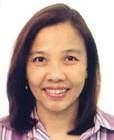
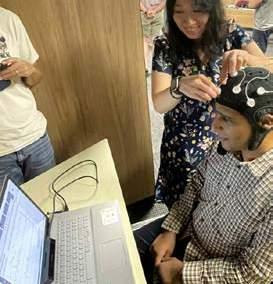
Nurhidayah Binte Sazali, Community Connector with South Central Community Family Service Centre, and Adrian Tan, Co-Founder of SG Assist, were the two appointed Community Fellows in 2022, while Ng Bee Leng, a social worker by training and the Director of Community Development and Corporate Support at AMKFSC Community Services Ltd, and Lee Unsu, a restaurant owner and filmmaker, were appointed Community Fellows in 2021.
IPS Programme on Race, Religion, and Intergroup Cohesion (IPS RRIC)
The IPS RRIC is the first empirically-based programme in Singapore aimed at promoting awareness, knowledge and competence in discussing, managing, and promoting race, religion and intergroup cohesion (e.g., immigration, class) in our society. The programme seeks to provide robust training and engagement tools (such as the use of VR for scenario enactment for experiential learning) to stakeholders such as government agencies, companies, educational institutions and non-profit organisations.
“On top of harnessing a diverse array of research methods, we are building up our own online panel of respondents that will include some of the demographic groups typically lacking in many other online panels, i.e. the lower income group, the elderly and those who use vernacular languages. A proprietary online panel will allow us to conduct quick polls on topical public policy issues to gather representative population data of high quality.” said Dr Mathew.
“We have been around for only about two years. We curate new ideas, co-design solutions with relevant communities and test their effectiveness through policy experiments; although we care about policy improvements as much as we care about trying something new,” said Dr Justin Lee.
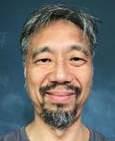

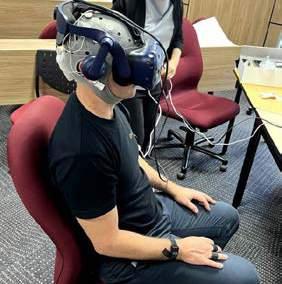
“Sometimes our work requires us to understand a problem better, so we have ongoing research projects to understand homelessness, savings behaviours of low-income families and social networks of youth with disabilities. However, we mainly engage in solution-focused research. This means reviewing the scientific evidence-based practice, using human-centred or social design principles, tapping into collective intelligence and adopting participatory research where relevant. We intend to venture into behavioural insights and remain open to creative and arts-based approaches to policy solutions.
Generally, I like solutions with a seed of systemic change embedded in them. For example, our ‘Learning Circles’ is not just a pilot with SINDA, but a larger conversation about collaborative learning as an alternative to hyper-competition in education. If we can unlock the peer-to-peer learning capabilities of the community — where youths teach and learn from one another — can this reduce the reliance on the private tuition industry? If we set up a community fund to provide interest-free loans to the poor so that they can meet their urgent credit needs, can this prevent them from getting into cycles of debt and displace predatory lenders?
We experiment with solutions that are premised upon the “small group as the unit of transformation” such as peer-to-peer learning circles, community support circles and direct giving circles. We also experiment with platforms and solutions that rely on mass citizen participation, such as socialcollab.sg, a wiki platform to crowdsource social needs. We are also keen to try participatory budgeting at the Town Council level, and would also like to tap into the collective intelligence of citizens to find solutions to divisive issues through deliberative polling and citizens’ panels.”

RESEARCH AGENDA
Nurhidayah Binte Sazali Adrian Tan Ng Bee Leng Lee Unsu
Institute of Policy Studies REVISITINGS Celebrating 35 Years (1988–2023) 33 32
Biometric sensors, such as eye tracking and facial expression analyses, are used to achieve comprehensive and high-quality data for investigating social issues and public opinion of significance.
Another project of note is Transforming the Non-Profit Sector (TNPS), a threeyear partnership between IPS and Tote Board aimed at improving the capabilities and capacities of non-profit organisations, as well as supporting partnerships between the private and public sectors in Singapore. The flagship activity is an annual conference beginning in 2021, while the project also features facilitated conversations among non-profit leaders, learning journeys, and overseas study trips to places such as Baltimore, United States of America (USA) to appreciate best practices. Based on the collective input from the series of engagements, IPS will produce policy papers with recommendations for the improvement of nonprofit sector capabilities.
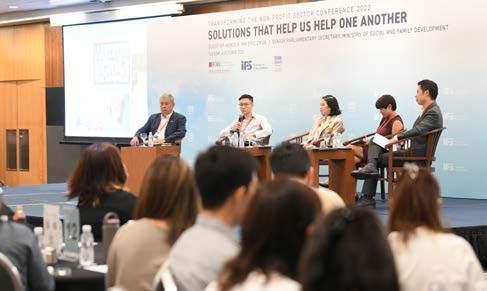
“Thanks to the pandemic forcing people to get on Zoom, we are now able to speak to experts from all over the world. Cost and time used to be prohibitive, but not anymore as very distinguished speakers are happy to show up for an hour or two online. We have therefore designed our conference series to be a collective learning journey, with preliminary virtual panels so that overseas speakers can share new ideas while local discussants weigh in on their relevance and feasibility in the local context. These preliminary conversations lead to an all-locals face-toface conference, and allow us to make sense of new ideas and its implications for Singapore’s non-profit sector.
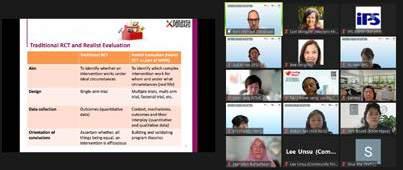
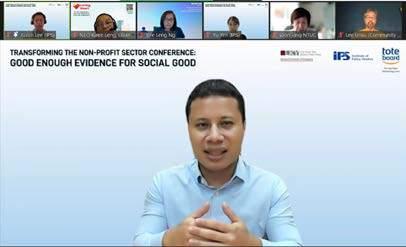
We also complemented more academic panel discussions with local learning journeys and overseas study trips when a more immersive and interactive experience aids the appreciation of new ways of doing things.”
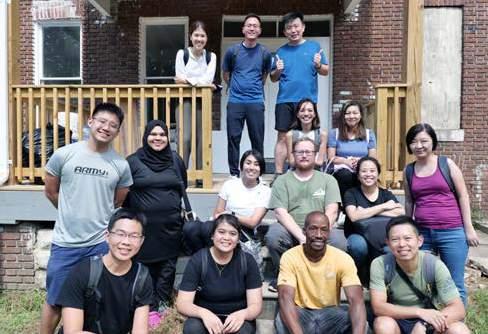 - Dr Justin Lee, Senior Research Fellow, Head of IPS Policy Lab
- Dr Justin Lee, Senior Research Fellow, Head of IPS Policy Lab
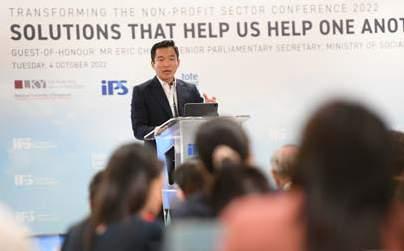 Speakers at the 2021 TNPS conference included Minister for National Development and Minister-in-charge of Social Services Integration Mr Desmond Lee.
Speakers at the 2022 TNPS conference included (from left) Mr Ang Hin Kee, CEO of the Singapore National Co-operative Federation (SNCF), Mr Lewin Low, Project Consultant at Solve n+1, Ms Rachel Loh, Senior Social Worker at the Fei Yue Community Services, Ms Denise Liu and Dr Justin Lee.
As part of the TNPS programme, Dr Justin Lee and a group of participants from the non-profit sector embarked on a study trip to Baltimore, USA to learn from several co-op businesses based there.
Participants at the 2021 TNPS conference, held fully online.
Speakers at the 2021 TNPS conference included Minister for National Development and Minister-in-charge of Social Services Integration Mr Desmond Lee.
Speakers at the 2022 TNPS conference included (from left) Mr Ang Hin Kee, CEO of the Singapore National Co-operative Federation (SNCF), Mr Lewin Low, Project Consultant at Solve n+1, Ms Rachel Loh, Senior Social Worker at the Fei Yue Community Services, Ms Denise Liu and Dr Justin Lee.
As part of the TNPS programme, Dr Justin Lee and a group of participants from the non-profit sector embarked on a study trip to Baltimore, USA to learn from several co-op businesses based there.
Participants at the 2021 TNPS conference, held fully online.
RESEARCH AGENDA Institute of Policy Studies REVISITINGS Celebrating 35 Years (1988–2023) 35 34
Mr Eric Chua, Senior Parliamentary Secretary, Ministry of Social and Family Development, delivered a keynote speech at the TNPS conference, 2022.
KEY EVENTS
IPS ORGANISES A HOST OF EVENTS OVER THE YEARS, FROM SMALL-SCALE FOCUS GROUPS AND CLOSED-DOOR DISCUSSIONS TO LARGER CONFERENCES SEEING OVER A THOUSAND PARTICIPANTS. EACH EVENT TYPICALLY FOCUSES ON A CENTRAL POLICY ISSUE OR THEME, CONSOLIDATING THE INSIGHTS AND PERSPECTIVES FROM PARTICIPANTS OF DIVERSE BACKGROUNDS, WHICH INCLUDE POLICYMAKERS, INDUSTRY EXPERTS, ACADEMICS AND EVEN THE WIDER CITIZENRY.
SOME OF THESE EVENTS HAVE BECOME IPS’ FLAGSHIP OFFERINGS, TAKING PLACE EITHER ANNUALLY OR BIENNIALLY.

KEY EVENTS
Institute of Policy Studies REVISITINGS Celebrating 35 Years (1988–2023) 37 36
Singapore Perspectives
Singapore Perspectives (SP) has been held annually since 2000, succeeding the previous IPS Year in Review conference series. Each iteration focuses on a specific theme, featuring relevant experts and stakeholders from both public and private sectors. The conference hosts about 1,000 attendees from key segments of society, namely the private and public sectors, civil society and students from a range of institutions.
Singapore Perspectives 2021 “Reset”

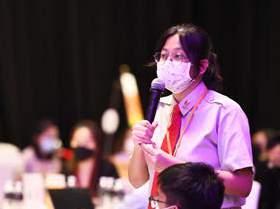
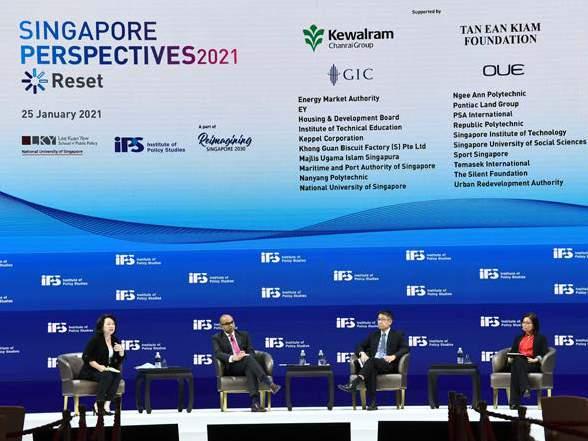
The conference went on amid the COVID-19 pandemic, with nine online interactive forums on the first three days, followed by a final hybrid conference day which adhered to the prevailing safety management measures. Aptly themed “Reset”, it brought together a select group of speakers to consider challenges presented by the disruption of the pandemic, as well as pre-existing trends and issues in different domains.
Singapore Perspectives 2022 “City”
Inspired by Mr S. Rajaratnam’s vision for Singapore to be a truly global city, the conference drew from the perspectives of leading urban thinkers, practitioners and researchers, exploring how Singapore can further actualise this vision by extending beyond the physical city to embrace new digitally-enabled financial, economic and social spaces.
“In SP2022, we wanted to curate a diverse conversation involving a wide range of speakers. This was possible because we had moved the event online for the first three days. However, having the event online came with challenges as well. In order to accommodate international speakers, we had to align different timezones as well as rely on recorded segments. Nonetheless, the conference was a success. The IPS team worked hard to manage the logistics of having both online and in-person segments. My experience with leading this conference has been a highly fulfilling one.”
Singapore Perspectives 2023 “Work”
The conference examined how disruptions and trends in technology, socioeconomic developments and Singapore’s own demographics will shape the future of work here. It also unveiled findings from the IPS Survey on Future of Work Singaporeans Want.
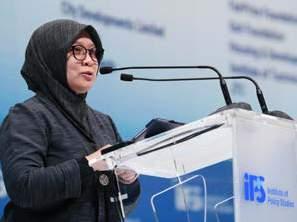
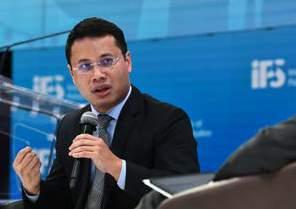

KEY EVENTS
- Dr Woo Jun Jie, Senior Research Fellow, Governance and Economy
The conference concluded with a dialogue session with Mr Desmond Lee, Minister for National Development and Minister-in-Charge of Social Services Integration.
Dr Intan Azura Mokhtar, Associate Professor of the Business, Communication and Design Cluster and Deputy Director of the Community Leadership and Social Innovation Centre, Singapore Institute of Technology, presenting at a panel.
Dr Gillian Koh, Deputy Director (Research) and Senior Research Fellow, in discussion with panellists (from left) Dr Janil Puthucheary, Senior Minister of State, Ministry of Communications and Information, and Ministry of Health; Mr Gerald Giam, Member of Parliament (Aljunied GRC) and Member of the Workers’ Party; and Ms Hazel Poa, Non-Constituency Member of Parliament and CEC Member of the Progress Singapore Party.
Prof Paul Tambyah, Senior Consultant, Division of Infectious Diseases, Department of Medicine, NUH and Professor, Department of Medicine, Yong Loo Lin School of Medicine, NUS, directing a question at panellists during a Question-and-Answer segment.
Institute of Policy Studies REVISITINGS Celebrating 35 Years (1988–2023) 39 38
A student participating in the Question-and-Answer segment.
Young Singaporeans Conference
The Young Singaporeans Conference (YSC) is held biennially since 2002. It gathers young Singaporeans who have shown leadership or excellence in their respective fields to discuss pertinent issues that are of concern to youths today. The YSC revolves around interactive exchanges between designated speakers, typically global and local thought-leaders, and among participants that hail from different sectors of society.
Young Singaporeans Conference 2020: “Choices”
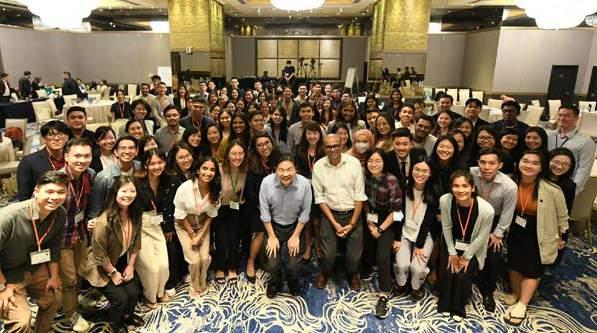
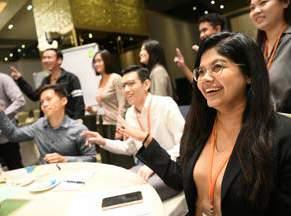
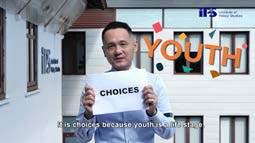
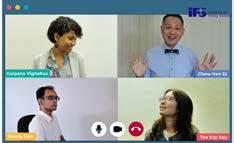
YSC2020 reflected on the choices young citizens face in a span of areas: about educational pathways, relationships, careers and family. The conference was held entirely online over three days, in consideration of the COVID-19 pandemic.
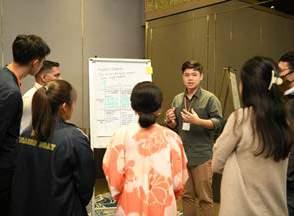
“YSC2020 was the first conference I organised as an IPS staff member. I had always been impressed as an attendee of IPS events, so I knew I had high standards to meet. I had the pleasure of organising it with Dr Teo Kay Key and Dr Kalpana Vignehsa, so we had good hands on deck. Through the process, I discovered that the secret sauce to successful IPS events is a very strong administrative team comprising our Events, Public Affairs and Admin Support Services. I have organised events and conferences all over the world, and the admin team behind IPS events is among the best I have worked with. The prospect of organising an IPS conference was daunting, but any doubts disappeared as soon as I realised the strength of the team.”
“YSC2020 was organised in the early days of the pandemic, and the team was learning how to run a wholly digital conference and collaborate online all at the same time. The researchers on board were all new to IPS, so everything was new. I think that beyond the requisite “Can you hear me?”, “Can you see my slides?” and “You are muted” in nearly all the sessions, the conference felt like a regular IPS conference, just without the face-to-face interaction. We learned not to overpack the sessions and spliced in novel programs like yoga and comedy hour. The team adapted to the pandemic and innovated. I still hope to meet the participants in person someday. Somehow, inperson interactions connect people in ways that digital engagement cannot.”
- Dr Chew Han Ei, Senior Research Fellow, IPS Social Lab
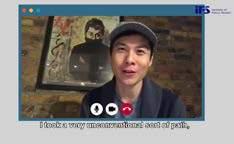
Young Singaporeans Conference 2022: “Uncharted”
The theme for the conference in 2022 was “Uncharted”, serving as a reflection of the uncertain path that lies ahead for todays’ youths, which may bring both turbulence and a wealth of new opportunities. Four broad areas were explored:
(1) diversity, inclusivity, and well-being, (2) social media and the online space,
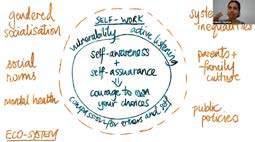
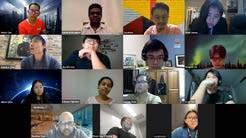

(3) climate change and sustainability and (4) life priorities and values. It took on a hybrid format, with the first day being fully online and the second being fully in-person.

KEY EVENTS
Institute of Policy Studies REVISITINGS Celebrating 35 Years (1988–2023) 41 40
YSC2022 featured a lightning session where teams presented their proposals to Guests of Honour, Deputy Prime Minister Mr Lawrence Wong and Senior Minister of State Dr Janil Puthucheary.
Singapore Economic Roundtable
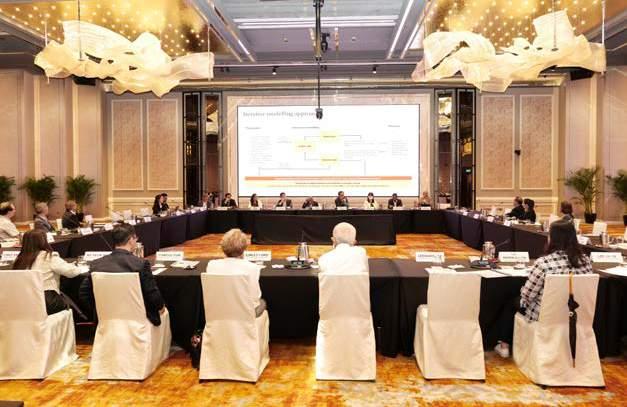
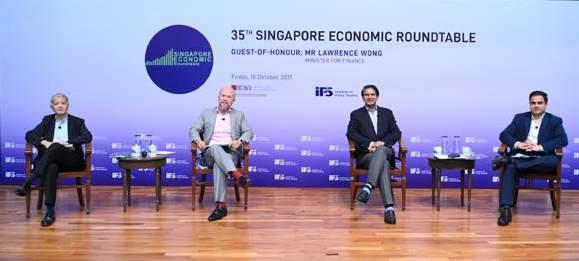

The Singapore Economic Roundtable (SER) is a twice-a-year meeting of a select group of senior private sector economists, academics, business leaders and policymakers. The Roundtable is conducted in line with Chatham House rules and is intended to generate a frank discussion of major macro-economic policy issues facing Singapore. Each SER assesses current monetary and fiscal policy in the light of changing economic circumstances and provides a forum for non-policymakers to air their recommendations. In addition, each SER also takes a detailed look at a longer-term structural issue facing Singapore. Some special topics in recent years included public debt and intergenerational equity in Singapore, sustainability and the implications of BEPS on Singapore’s investment and financial hub status.
The 35th SER held on 15 October 2021 featured a special session with Mr Lawrence Wong. In one of his first major speeches as Finance Minister, he outlined the challenges and principles of Singapore’s fiscal system and spoke on studying options to expand its system of wealth taxes while staying competitive, such as implementing stamp duties on residential properties, property taxes and additional registration fees on motor vehicles.
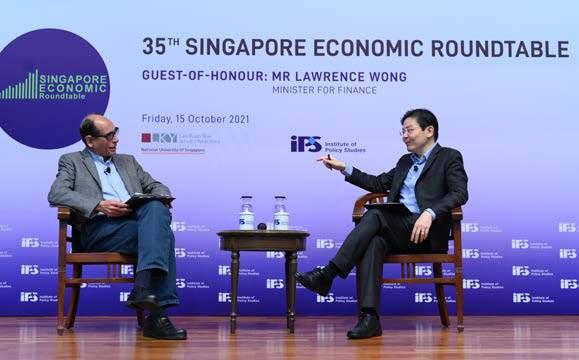
Mr Wong summed up Singapore’s key challenges into three areas: inequality, demographics and climate change. He also announced that the carbon tax rate will be revised from 2024.
“Since its inception, the topics discussed at the SER has become more diverse and complex, reflecting the changing trends and events influencing global economic outlook. Being an open trading economy and a “price-taker”, issues like the deglobalisation of the world economy, realignment and disruption of supply chain networks will impact the Singapore economy. In a more volatile, uncertain, complex and ambiguous (VUCA) world, the SER has renewed significance.
Convened under Chatham House rules, it is also a platform for policymakers to elucidate thinking behind policy formulation and implementation. This engagement enables the participating economists, bankers and corporate leaders to provide timely and constructive feedback to policymakers. Thereafter, the proceedings are published for dissemination to a wider audience.”
- Dr Faizal Yahya, Senior Research Fellow, Governance and Economy
KEY EVENTS
Prof Danny Quah, Dean and Li Ka Shing Professor in Economics, Lee Kuan Yew School of Public Policy moderated a panel discussion with Mr Chris Woo, Tax Leader, PwC Singapore; Mr Taimur Baig, Managing Director and Chief Economist, Group Research, DBS Bank Ltd; and Professor Ramkishen Rajan, Yong Pung How Professor, Lee Kuan Yew School of Public Policy, at the 35th SER, 2021.
Minister for Finance Mr Lawrence Wong speaking at a dialogue session moderated by Mr Vikram Khanna, Associate Editor at The Straits Times.
Institute of Policy Studies REVISITINGS Celebrating 35 Years (1988–2023) 43 42
Participants at the 37th SER, 2022.
S R Nathan Fellowship for the Study


of Singapore
The late S R Nathan, Singapore’s sixth and longest serving President, dedicated his life to public service and the advancement of Singapore. To recognise Mr Nathan’s unique contributions, IPS began the process of establishing the S R Nathan Fellowship for the Study of Singapore in late 2012 to advance research on public policy and governance issues.
With generous support from individual and corporate donors, IPS raised around S$5.9 million (including matching grants from the government) in 2013 to endow the Fellowship.

S R Nathan Fellows present their research findings and policy ideas to the public by delivering three to six lectures during the course of the academic year. Delivered at NUS, the IPS-Nathan Lectures serve to enrich the vibrant intellectual and cultural life on campus, and seek to advance public understanding and discussion of issues of critical national interest.
S R Nathan Fellowship for the Study of Singapore
Highlights:
6th IPS-Nathan Lecture Series: “The Idea of Singapore: Smallness Unconstrained” by Prof Tan Tai Yong



Prof Tan Tai Yong sought to explain how Singapore has evolved over a period of 700 years. He identified some of the underlying continuities to show that history is not merely a thing of the past; but by understanding how our island has been shaped by its history, we can have a better appreciation of our current and continued challenges as a city-state.
7th IPS-Nathan Lecture Series: “World in Transition: Singapore’s Future” by Prof Chan Heng Chee







Prof Chan Heng Chee analysed the uncertain and fast-changing world, and Singapore’s place in it. She examined the major fault lines today, wrought by the sudden COVID-19 pandemic, the ongoing malfunctioning of democracies and capitalist economies and the unravelling of the world order.
8th IPS-Nathan Lecture Series: “Gender Equality: The Time Has Come” by Ms Corinna Lim




Ms Corinna Lim, Executive Director of AWARE, examined the most pressing concerns facing women in Singapore, contributing her insights to the national gender equality review. She tackled the issues of masculine norms that are harmful, support for family caregiving and comprehensive sex education in Singapore.
9th IPS-Nathan Lecture Series: “The Singapore Synthesis: Innovation, Inclusion, Inspiration” by Mr Ravi Menon


Mr Ravi Menon, Managing Director of the Monetary Authority of Singapore, examined how Singapore will come under pressure from four tectonic shifts altering the global landscape. To secure our future, he proposed that Singapore will need more innovation, inclusion and inspiration.
10th IPS-Nathan Lecture Series: “Singapore and Multilateral Governance: Securing Our Future” by Dr Noeleen Heyzer
Dr Noeleen Heyzer, former United Nation Under Secretary-General, examined how Singapore can continue to contribute to multilateral governance amid 21st century global challenges.

11th IPS-Nathan Lecture Series: “Stewardship of the Singapore Media: Staying the Course” by Mr Patrick Daniel
Mr Patrick Daniel, a veteran journalist and editor, analysed the evolution of Singapore’s legacy media from colonial times. He examined pressing issues arising from digital disruptions and outlined the desired future for Singapore’s media industry.
12th IPS-Nathan Lecture Series: “Living with Civilisations: Reflections on Southeast Asia’s Local and National Cultures” by Prof Wang Gungwu
Prof Wang Gungwu explored how the cultures of the Southeast Asia region interacted with four major civilisations and how these civilisations shaped local identities and cultures in the process. Understanding the history of Singapore from this perspective will give us insight to how the country’s modern identity is being shaped and enable us to better understand our region’s place in the modern world order.
KEY EVENTS
1st S R Nathan Fellow, Mr Ho Kwon Ping
5th S R Nathan Fellow, Dr Cheong Koon Hean
9th S R Nathan Fellow, Mr Ravi Menon
2nd S R Nathan Fellow, Mr Bilahari Kausikan
6th S R Nathan Fellow, Prof Tan Tai Yong
10th S R Nathan Fellow, Dr Noeleen Heyzer
3rd S R Nathan Fellow, Mr Peter Ho
7th S R Nathan Fellow, Prof Chan Heng Chee
11th S R Nathan Fellow, Mr Patrick Daniel
4th S R Nathan Fellow, Mr Lim Siong Guan
8th S R Nathan Fellow, Ms Corinna Lim
12th S R Nathan Fellow, Prof Wang Gungwu
Institute of Policy Studies REVISITINGS Celebrating 35 Years (1988–2023) 45 44
Asia Journalism Fellowship
The Asia Journalism Fellowship (AJF) is a Temasek Foundation (TF) programme hosted by IPS. The Fellowship has welcomed 205 Asian journalists to Singapore since 2009. It is a highly regarded mid-career programme for journalists, valued as time out from the newsroom for Fellows to recharge, learn and understand more about one another’s countries and get to know Singapore. The programme complements IPS’ research on media developments.
The AJF was a three-month programme held in Singapore from its start until 2019. The COVID-19 pandemic forced the 2020 programme to be cancelled and in 2021, it resumed as a six-week fellowship run online only.
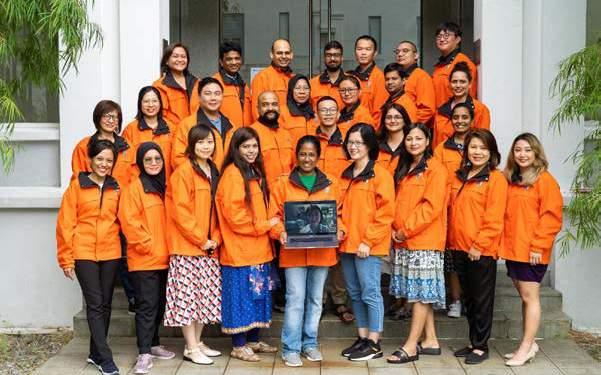
“Temasek Foundation did not want us to pause another year, and so the Institute of Policy Studies said “yes” to going ahead with an online AJF in 2021. The 17 Fellows selected were promised a trip to Singapore as soon as international travel became possible again. In 2022, a hybrid AJF allowed 14 Fellows to meet online for four weeks before both groups came to Singapore from 12 to 23 September. This was a first for AJF, and having a big crowd together day and night made for a packed schedule of serious and fun activities, and memories to last a lifetime.”
- Mr Alan John, Director of AJF
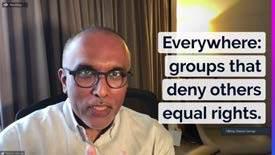
In 2023, the AJF will remain a hybrid programme with four weeks online and four weeks in Singapore. So far, 205 journalists from 20 Asian countries and territories have taken part, creating a strong network of alumni who regularly keep in touch.
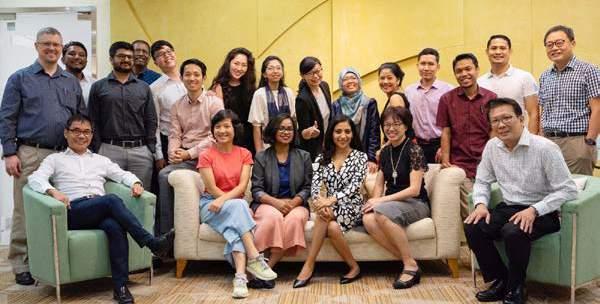
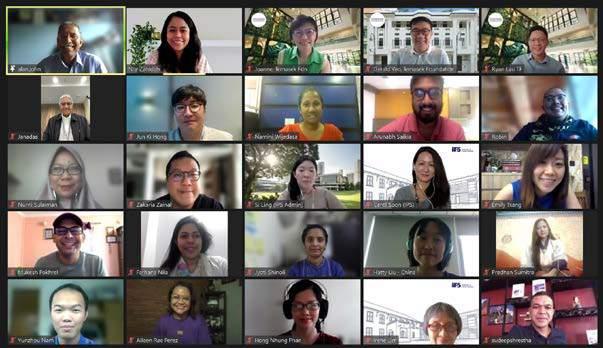
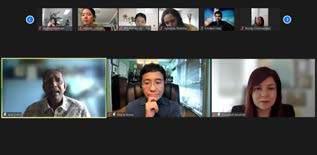

KEY EVENTS
AJF 2021 and AJF 2022 gathered in Singapore in September 2022.
Institute of Policy Studies REVISITINGS Celebrating 35 Years (1988–2023) 47 46
AJF 2021 carried on online in 2021 in light of the COVID-19 pandemic, with sessions held via Zoom.
TIDING THROUGH UNCERTAINTY
AMIDST THE PANDEMIC, IPS EVENTS PIVOTED ONLINE TO CONTINUE DISCUSSIONS ON THE SOCIAL, POLITICAL AND ECONOMIC REALM. IN 2020 AND 2021, THERE WERE 70 PUBLIC AND CLOSED-DOOR EVENTS THAT PRESENTED AND DISCUSSED RESEARCH FINDINGS, PROMOTING DISCOURSE ON POLICY ISSUES AMONG THE PUBLIC, PRIVATE AND PEOPLE SECTORS, AS WELL AS THE GENERAL PUBLIC.

TIDING THROUGH UNCERTAINTY
Institute of Policy Studies REVISITINGS Celebrating 35 Years (1988–2023) 49 48
IPS Online
IPS Online is a virtual series which includes pandemic-related care and policy topics, post-GE2020 survey findings, and on reimagining happiness, prosperity and progress for Singapore in 2030.
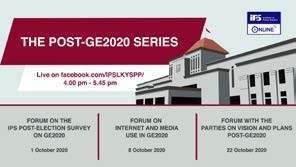
IPS Women’s Conference
“IPS Online enabled the Institute to sustain our connections with the audience and expand our reach to attendees from all over the world during the pandemic. It is an important milestone for IPS and sets the stage for new possibilities and growth in the events we organise in the future.”
– Ms Ong Si Ling, Senior Manager (Events and Admin)
In fact, IPS’ first Facebook live on 25 February 2020 was a forum on Singapore’s response to COVID-19, discussing the medical, economic, media and social impact of the pandemic.
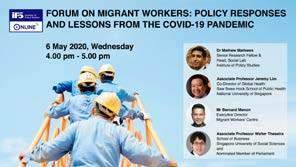
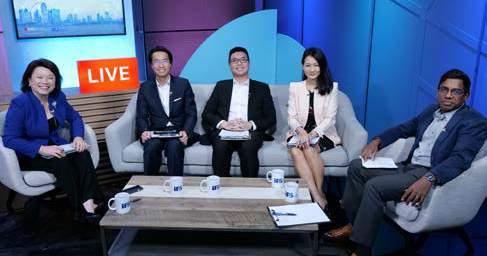
The inaugural IPS Women’s Conference 2021 — Gender Equality in Singapore: An Action Plan for Progress, was held on 3 June 2021. It brought together academics, activists and community leaders to discuss the challenges Singaporean women face in a changing world.
President Halimah Yacob gave the opening address, urging whole-of-society efforts to change societal norms and practices to better support women. There were three moderated panel discussions: (1) Equal Work, Equal Pay; (2) Home is Where the Work is; and (3) Mindsets and Minefields. Then, Minister for Home Affairs and Law Mr K Shanmugam and Sengkang GRC Member of Parliament Ms He Ting Ru answered questions on levelling the playing field for women during the closing dialogue.
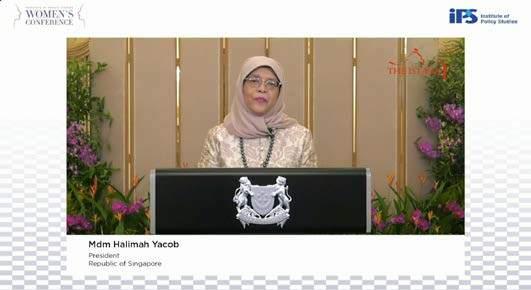
“The IPS Women’s Conference aimed to inform the government’s then-review of women’s issues in a move towards greater gender equality. The COVID-19 pandemic provided the backdrop for the conference as it had exacerbated and made more visible the challenges women faced at work, at home and in an increasingly pervasive digital space.
“It was ‘business unusual’ as we felt the ever more acute need to bring various policy communities together to discuss how Singapore was responding to the multifarious challenges of the pandemic. With the support of various communications partners, we quickly became well-practised in the delivery of these bridge-building events online by the time the general elections came around in July that year. We were able to launch studies, conduct research, generate creative output using interactive whiteboards, and we believe, reach new audiences for our work.”
- Dr Gillian Koh, Senior Research Fellow, Deputy Director (Research)
For instance, gendered division of labour at home, which became starker during the pandemic as women spent more time at home, had a huge impact on gender parity at the workplace. The one-day conference navigated age-old issues of gender inequality and identified best practices for policy action to build a gender-inclusive society in Singapore. What was clear from the discussions was that improving gender equality is a wicked problem that requires an ecosystem approach, with parallel interventions in different domains – caregiving, workplace practices, STEM education of girls and women and changing the mindsets of both men and women. Building a gender-inclusive society will always be a work-in-progress but the conference, together with the national review, identified actionable steps everyone can take.
- Dr Carol Soon, Principal Research Fellow, Head of the Society and Culture department


”
TIDING THROUGH UNCERTAINTY
From left to right: The forum was chaired by Dr Gillian Koh and the panellists were Adjunct Assoc Prof Vernon Lee, Mr Barnabas Gan, Dr Carol Soon and Dr Shashi Jayakumar.
Institute of Policy Studies REVISITINGS Celebrating 35 Years (1988–2023) 51 50
President Halimah Yacob giving her opening address.
IPS-RSIS Forum on IPS-RSIS Conference
Race and Racism in Singapore
on Identity


Jointly organised with the S. Rajaratnam School of International Studies, the IPSRSIS Forum on Race and Racism in Singapore arose amidst recent episodes of racial intolerance. With even more public attention drawn to Singapore’s multiracialism and social cohesion, the forum aimed to facilitate a constructive discussion on racial fault lines in Singapore.
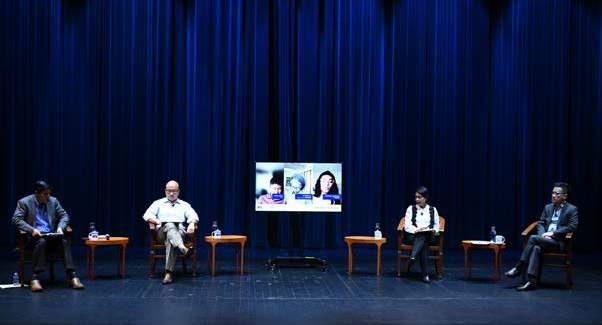
Streamed online on 25 June 2021 with some 1,600 real-time viewers, the event involved a keynote address by Minister for Finance Mr Lawrence Wong, and a panel discussion featuring academics and practitioners familiar with local public discourse on race and racism.
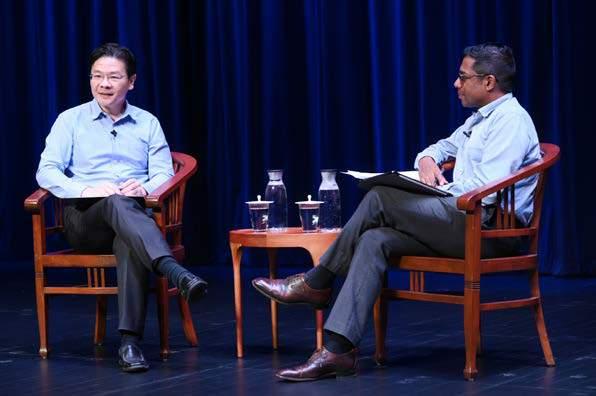
Also jointly organised by IPS and RSIS was the IPS-RSIS Conference on Identity, which discussed debates on the multiplexity of identity in Singapore and its impact on nation-building, Singaporean identity and solidarity.
The conference, held on 23 November 2021, featured an opening speech and dialogue with Minister for Finance Mr Lawrence Wong, followed by two panels featuring academics and practitioners on these issues, stemming from the topics “Identities and Diversity” and “Innovating Engagement”.
“The IPS-RSIS Forum and Conference were held at a time when there was a global spotlight on race relations and identity issues, especially following the wake of global activism that was precipitated by the unjustified death of George Floyd in the United States of America. Locally, several racially-charged incidents came to the fore of the public eye and gave rise to formal and informal discussions on the prevalence of racism in Singapore, with some charging that structural racism still prevailed in the nation. On top of discussions related to ethnic identities, debates over sexual identity have also grown more prevalent over recent years as there is a growing appetite among Singaporeans to discuss social issues which are intertwined with the Singapore identity or identities.
Social media has also spurred conversations and contestations on issues relating to identity and diversity by providing the space for people from diverse backgrounds to initiate frank discussions and rally for change. Such developments have also raised questions about emerging trends in activism and the best ways to facilitate open, healthy discourse. Given this spectrum of issues, it was important to organise a forum to allow residents to express their views and engage in dialogues with political office holders and subject experts on their vision of the way forward.”
- Dr Mathew Mathews, Principal Research Fellow, Head of Social Lab
TIDING THROUGH UNCERTAINTY
Minister for Finance Mr Lawrence Wong (left) at the IPS-RSIS Forum on Race and Racism in Singapore.
Institute of Policy Studies REVISITINGS Celebrating 35 Years (1988–2023) 53 52
IPS’ Dr Mathew Mathews moderating a discussion with speakers and respondents who participated virtually.
CASTING INFLUENCE
IPS CONTINUES TO ANALYSE PUBLIC POLICY, BUILD BRIDGES BETWEEN THOUGHT LEADERS AND COMMUNICATE ITS FINDINGS TO A WIDE AUDIENCE. THIS IS TO RAISE PUBLIC AWARENESS OF POLICY ISSUES AND FOSTER DEBATE AND DISCUSSIONS.

CASTING INFLUENCE
Institute of Policy Studies REVISITINGS Celebrating 35 Years (1988–2023) 55 54
Beyond directly contributing to policy discussions through research, the Institute of Policy Studies (IPS) has also built a strong presence in the local media over the years, with researchers regularly publishing opinion editorials on issues of public interest.
Events and research are also widely covered by the local media, amplifying the reach of the Institute’s research undertakings and efforts at catalysing discourse on pertinent areas among diverse stakeholders and different segments of society.
Building resilient communities in the age of disinformation








Carol Soon
Are Singaporeans really politically apathetic?
Teo Kay Key
Fixing ‘broken’ youth not enough to tackle mental health issues — nurture them to flourish in life too
Isabelle Tan, Vincent Chua and Chew Han Ei
Challenging racism starts in the family
Mathew Mathews and Shane Pereira
How the Workers’ Party won big this General Election
Gillian Koh
The road to better pandemic planning
Raising taxes and cutting expenditure not ideal solutions to greater demands on Government budget
Christopher Gee and Yap Jia Hui
Imbangi peranan yang dipikul isteri dan suami (Balancing the roles of wife and husband)
Shamsuri Juhari and Jeanne Tan
Singapore has to face tax question as it ages: policymakers
If Singapore is so wealthy, why do its citizens feel stuck?
罗宾汉的预算案? (A Robin Hood Budget?)
Liang Kaixin
IPS study finds low digital literacy level in S’pore; 6 in 10 respondents believed false info
A 59-Hour Week Is Common for Singapore Gig Workers, Study Shows
Singapore right to be concerned about racist incidents as there is ‘always a risk’ of regression on race issues: Lawrence Wong
(75% of Singaporeans are satisfied with the Government’s pandemic management)
CASTING INFLUENCE
Woo Jun Jie
七成半国人对政府管 理疫情方式感到满意
11 May 2018 23 October 2022 23 November 2022 8 April 2021 14 July 2020 18 November 2019 13 February 2023 18 February 2023 17 December 2020 1 March 2022 20 May 2023 16 October 2019 25 June 2021 22 January 2018 8 September 2022 Institute of Policy Studies REVISITINGS Celebrating 35 Years (1988–2023) 57 56
Key Numbers
Number of Events:
Number of Media Coverage:
Number of Op-Eds Published:


Number of IPS Staff:
4,052
IPS seminars, conferences and workshops: Analysis/ insights by IPS researchers on public policy issues:


182

239 46 96
1,411
2,641 in 2018* in 2023
IPS has published 180 books, 50 IPS Working Papers and 25 volumes of the IPS Exchange Series over the past 35 years. These publications span an array of topics in areas of governance, politics, society and the economy. The IPS Working Papers and the IPS Exchange Series also serve as platforms to communicate findings from research conducted by IPS or with IPS support, as well as deliberations and policy suggestions that arise from the Institute’s programmes.

The Singapore Chronicles Series was initiated by IPS and Straits Times Press to commemorate the 50th anniversary of Singapore’s Independence. With the aim of recording, explaining and offering insights into what makes Singapore unique, the series covers a wide range of subjects from the philosophical to the mundane, and the fundamental to the practical. 35 volumes were published between 2016 and 2017, with 11 more published in 2018 and 2019.






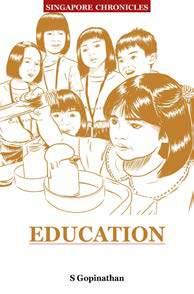
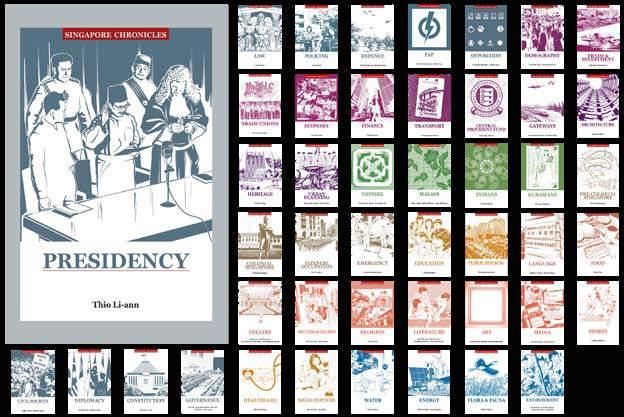
Looking back at the past five years
2018
March
(January
to
2023)
Publications
Singapore Chronicles Series
CASTING INFLUENCE *As of 31 August 2018 Institute of Policy Studies REVISITINGS 59 Celebrating 35 years (1988-2023) 58
IPS-Nathan Lecture Series
Lectures delivered by appointed S R Nathan Fellows along with their Question-andAnswer sessions are consolidated and published. As of May 2023, there are 11 books under the IPS-Nathan Lecture Series, with more than 20,000 copies sold so far.
Other Titles
Authored Books

Building Immunity: Crisis and Contagion in the City State (2022) by Woo Jun Jie.
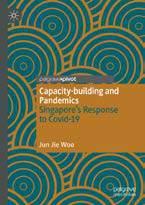
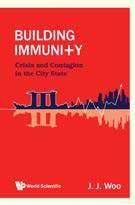


Singapore Perspectives
Capacity-building
-
Social
in
Edited Books
The Power
Singapore Perspectives: Politics by Natalie Pang and Shamil Zainuddin. Singapore Perspectives: Singapore. World by Ariel Tan, Andrew Lim and Rachel Hau.

Immigrant Integration in Contemporary Singapore (2023) by Mathew Mathews and Melvin
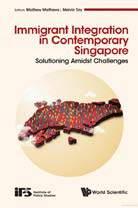




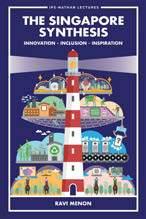
Religion and Identity Politics: Global Trends and Local Realities (2021) by Mathew Mathews

Insights on Singapore’s Economy and Society from Leading Thinkers: From the Institute of Policy Studies’ Singapore Perspectives.


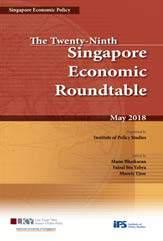
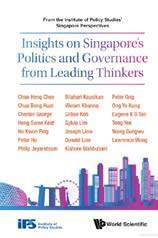
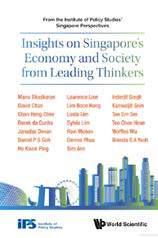
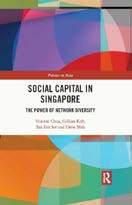

Insights on Singapore’s Politics and Governance from Leading Thinkers: From the Institute of Policy Studies’ Singapore Perspectives.

Singapore Economic Roundtable


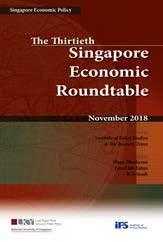
Singapore Perspectives 2018: Together by Christopher Gee, Yvonne Arivalagan and Chao Fengqing.
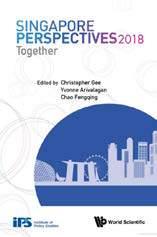
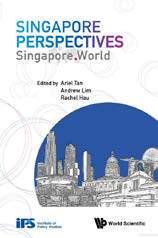
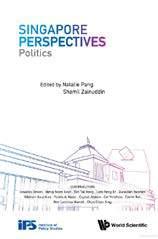 and Pandemics
Singapore’s Response to COVID-19 (2021) by Woo Jun Jie.
Capital
Singapore:
of Network Diversity (2020) by Vincent Chua, Gillian Koh, Tan Ern Ser and Drew Shih.
Tay.
and Melvin Tay.
and Pandemics
Singapore’s Response to COVID-19 (2021) by Woo Jun Jie.
Capital
Singapore:
of Network Diversity (2020) by Vincent Chua, Gillian Koh, Tan Ern Ser and Drew Shih.
Tay.
and Melvin Tay.
CASTING INFLUENCE Institute of Policy Studies REVISITINGS Celebrating 35 Years (1988–2023) 61 60
Public Engagement
IPS is often looked upon as the authoritative voice to analyse and dissect local political and social issues. Researchers are regularly tapped on to provide policy recommendations and comments based on evidence-based research. The Singapore Perspectives conferences and other roundtables and forums are widely reported on by the media, and generate insightful discussions about complex topics such as governance and diversity.
The Digital Space
The digital space remains an invaluable platform in communicating the Institute’s output to the wider public.
This includes the IPS website, which serves as a depository of the Institutes’ research and event records and IPS Commons, a platform publishing commentary by both IPS researchers and external parties, in promoting rational discussion of public policy ideas in Singapore. First launched in 2012, it aims to expand the intellectual space and increase the quality of public engagement on national issues. The IPS Commons webpage was revamped in October 2022 with a new design and layout.
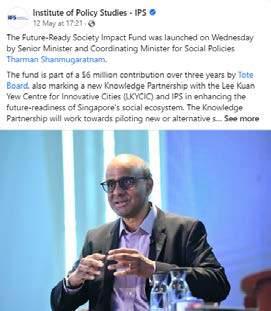
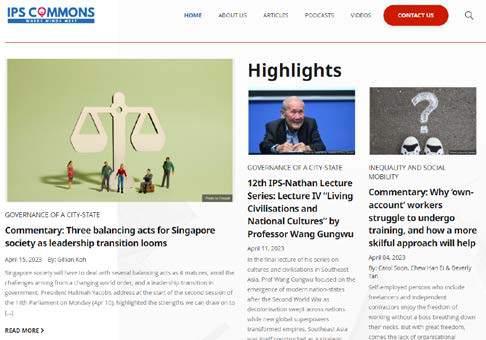
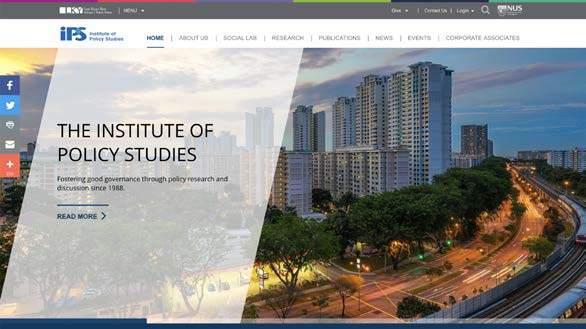
IPS is also active on various social media platforms, namely Facebook, LinkedIn, Twitter, Instagram and YouTube. Policy opinions of IPS researchers featured in the news are often shared, along with bite-sized “IPS in the News” visual summaries highlighting key points of opinion editorials written by researchers. Full videos of most conferences and lectures are uploaded to YouTube as well, available for public access.
“A concerted effort has been put in to grow our online presence on social media platforms such as Facebook, Instagram, Twitter, LinkedIn, YouTube and TikTok. Using colourful infographics and snappy short videos, research findings are broken down into bite-sized nuggets of information so that they are more palatable for the general and younger audience. This also helps to increase the mindshare of IPS in the public space.”
- Ms Liang Kaixin, Associate Director (Communications and Public Affairs)
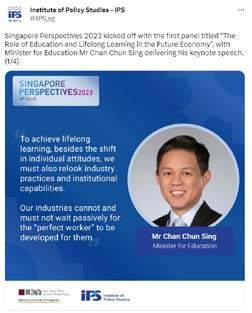
Facebook
Twitter

CASTING INFLUENCE
Institute of Policy Studies REVISITINGS Celebrating 35 Years (1988–2023) 63 62
IPS has also published short video content on TikTok. Still in its infancy, the account has featured excerpts from research projects as well as public lectures.

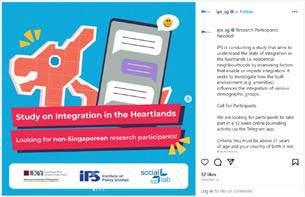
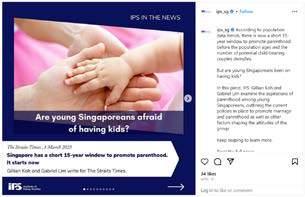
On Diversity Podcast
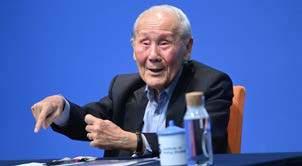
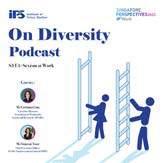
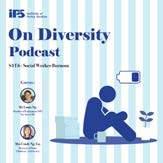
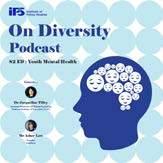
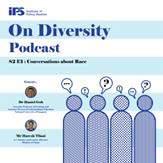

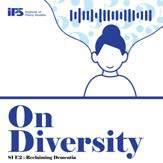
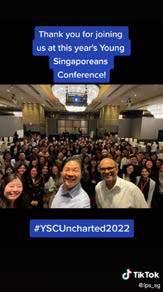
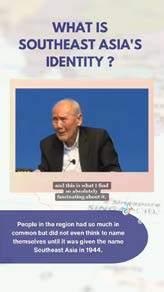
A key issue raised during the 2020 General Election was the need for more diversity – in representation, in opinions and in solutions. It has become clear that Singaporeans are becoming more confident about their identities and their right to be heard and considered. Unlike in the past, they are unafraid to speak up against the status quo.
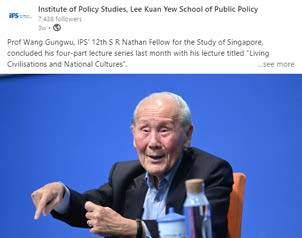
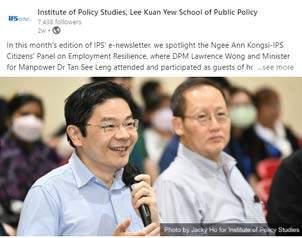
Authentic and impartial conversations are thus more crucial than ever. On Diversity, the first podcast series by IPS, aims to address this need, with each episode centred on an issue in the space of diversity, gleaning insights and views from two unique guests. Issues explored by the podcast in the latest season included sexism, ageism, ableism and racism at work, palliative care for the old and young, and the burnout faced by social workers.
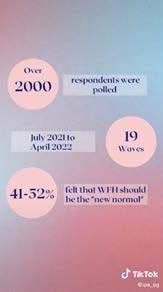
CASTING INFLUENCE
TikTok
Instagram YouTube Institute of Policy Studies
LinkedIn REVISITINGS Celebrating 35 Years (1988–2023) 65 64
OUR PEOPLE
IPS HAS BEEN SHAPED AND NURTURED OVER ITS 35 YEARS BY THE TIRELESS EFFORTS AND DEDICATION OF ITS PEOPLE, RESEARCHERS AND ADMIN STAFF ALIKE.

OUR PEOPLE
Institute of Policy Studies REVISITINGS Celebrating 35 Years (1988–2023) 67 66
Leadership over the years
IPS Directors
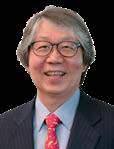
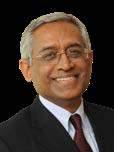
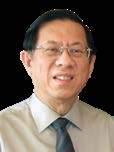
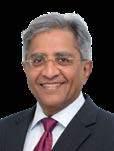
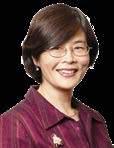

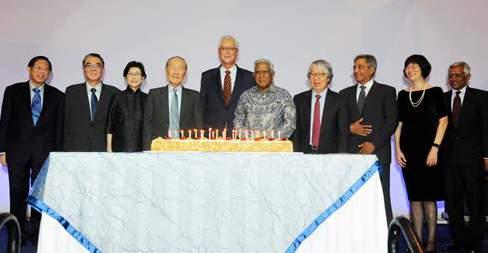
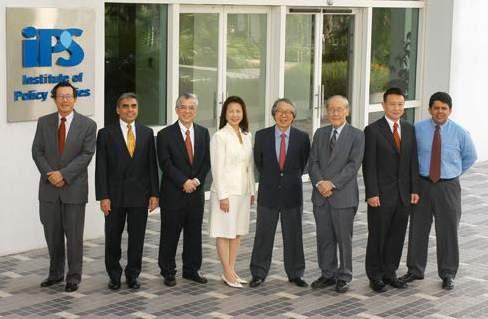
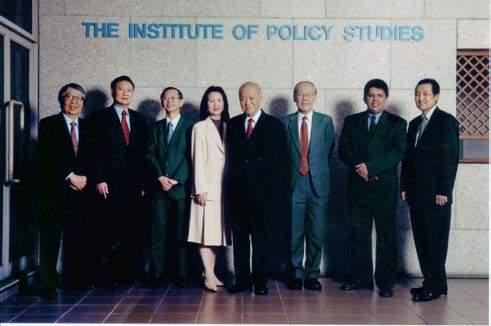
Chairmen
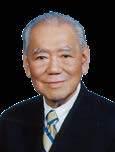
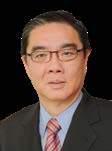
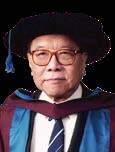
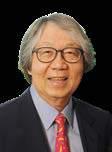

OUR PEOPLE
Mr Hsuan Owyang (fourth from right) with members of the IPS Board of Governors.
Prof Tommy Koh (fourth from right) with members of the IPS Board of Governors.
Directors of IPS with Emeritus Senior Minister Mr Goh Chok Tong and former President S R Nathan.
Prof Chan Heng Chee Founding Director (1987–1988)
Mr Arun Mahizhnan Acting Director (2004–2008)
CJ Yong Pung How (1988–1989)
Ambassador Ong Keng Yong Director (2008–2011)
Mr Hsuan Owyang (1989–2004)
Mr Janadas Devan Director (since 2011)
Prof Tommy Koh (2004–2010)
Prof Jon Quah Acting Director (1988–1990)
Prof Tommy Koh Director (1990–1997), (2000–2004)
Institute of Policy Studies REVISITINGS Celebrating 35 Years (1988–2023) 69 68
Dr Lee Tsao Yuan Director (1997–2000)
Not in group photo
Society and Culture
to right: Shaw Wen Xuan, Research Assistant Laurel Teo, Senior Research Fellow ; Sufia Maisarah Binte Roslan, Research Assistant ; Samantha Quek, Research Assistant ; Carol Soon, Principal Research Fellow and Head of Department ; Beverly Tan, Research Assistant ; Robyn Tan, Research Fellow Mohamad Shamsuri Bin Juhari, Research Fellow Dhannea Rohaizad, Research Associate

Not in group photo (from top to bottom): Ann Mak, Research Assistant ; Jeanne Tan, Research Assistant.





Governance and Economy




From left to right: Gabriel Lim, Research Assistant ; Leon Lim, Research Fellow ; Woo Jun Jie, Senior Research Fellow Gloria Yuanbin Lim, Research Assistant ; Yap Jia Hui, Research Assistant ; R Avinash, Research Assistant ; Gillian Koh, Deputy Director (Research) and Senior Research Fellow ; Christopher Gee, Senior Research Fellow and Head of Department Sarah Lim, Intern; Eddie Choo, Research Associate; Kalpana Vignehsa, Senior Research Fellow ; Faizal Bin Yahya, Senior Research Fellow.
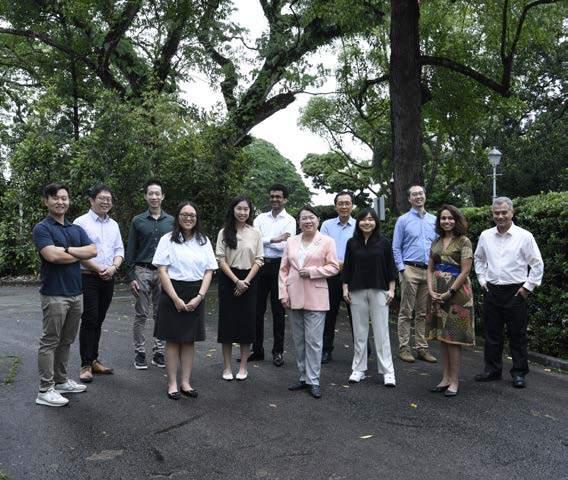
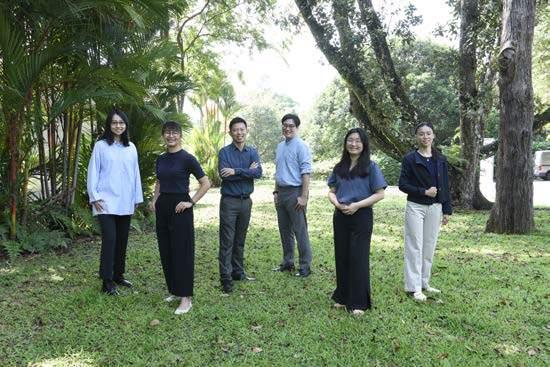
Not in group photo (from top to bottom): Euston Quah, Adjunct Principal Research Fellow ; Yap Mui Teng, Adjunct Principal Research Fellow ; Manu Bhaskharan, Adjunct Senior Research Fellow ; Sandy Lee, Research Assistant
Not in group photo
Policy Lab
From left to right: King Yu Yen, Research Assistant ; Francesca Lee, Research Assistant Justin Lee, Senior Research Fellow and Head of Department Harry Tan, Research Fellow ; Rachel Ng, Research Assistant Jenin Teo, Research Assistant
Not in group photo (from top to bottom): Freddy Hong, Adjunct Senior Research Fellow Hana Alhadad, Adjunct Research Fellow ; Ruby Thiagarajan, Research Assistant

OUR PEOPLE
Research
in group
Not
photo
From left
Institute of Policy Studies REVISITINGS Celebrating 35 Years (1988–2023) 71 70
Social Lab Research




From left to right: Shamil Zainuddin, Research Associate; Elizabeth Lim Xiao Pei, Research Associate; Wong Chin Yi, Research Fellow Mindy Chong, Research Assistant Melvin Tay, Research Associate; Isabelle Tan, Research Assistant Sim Kai Lin, Research Associate Sophy Tio, Research Associate; Samantha Nah, Research Assistant ; Teo Kay Key, Research Fellow ; Shane Nicolas Pereira, Research Associate; Sakunika Wewalaarachchi, Manager (Planning and Development); Mathew Mathews, Principal Research Fellow and Head of Department Ezzafatin Binte Mohamed Aslam, Research Assistant ; Phua Mei Yen Amy, Research Associate; Pamela Lee, Project Specialist ; Elvin Xing Yifu, Research Associate Clara Lee, Graduate Policy Researcher ; Alicia Wang, Research Associate; Hanniel Lim, Research Assistant ; Minzheng Mike Hou, Associate Director (Planning and Development); Tan Ern Ser, Academic Adviser

Not in group photo (from top to bottom): Tong Chee Kiong, Adjunct Principal Research Fellow Lal Nelson, Adjunct Senior Research Fellow ; Chew Han Ei, Senior Research Fellow ; Leonard Lim, Adjunct Research Fellow ; Thian Wen Li, Research Associate Ali Akbar, Research Assistant ; Hazim Zulfadhli, Research Assistant ; Wynn Tan, Research Assistant
Deputy Director (Admin) and Finance



Not in group photo
Special Projects

General Admin
From left to right: Cecilia Kuek, Assistant Senior Manager ; Syed Muhammad Fuad Bin Syed Fathil, Management Assistant Officer Eileen Tan, Personal Assistant to Special Adviser and Director ; Cheryl Tan, Executive; Mazlan Bin Mahmood, Operations Associate
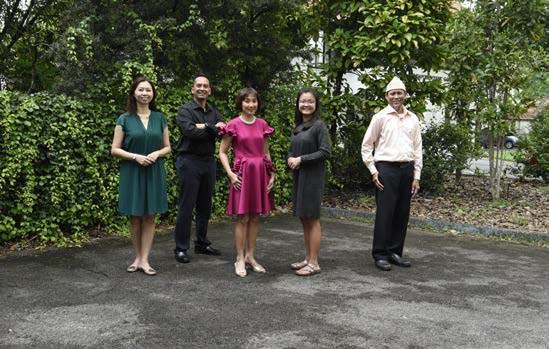
Not in group photo (from top to bottom): Jane Ong, Executive; Sherry Teo, Management Assistant Officer





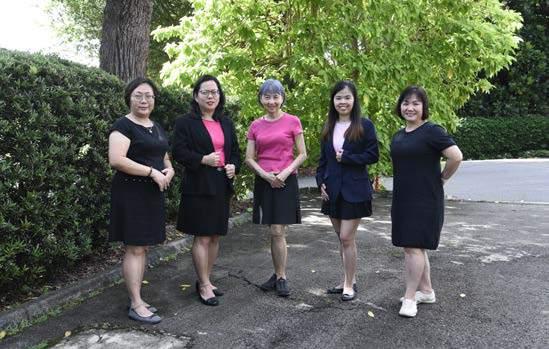
OUR PEOPLE
Not in group photo
Administration
From left to right: Karen Kuet Poh Lin, Management Assistant Officer ; Choo Yen Ping, Senior Manager ; Irene Lim, Deputy Director (Admin); Lim Pei Wen, Management Assistant Officer ; Chanel Ang, Assistant Manager
Institute of Policy Studies REVISITINGS Celebrating 35 Years (1988–2023) 73 72
Arun Mahizhnan, Special Research Adviser Phua Kai Hong Adjunct Senior Research Fellow
Public Affairs
Events
Corporate Associates
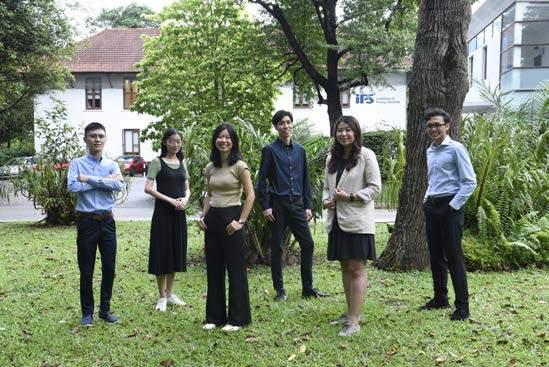
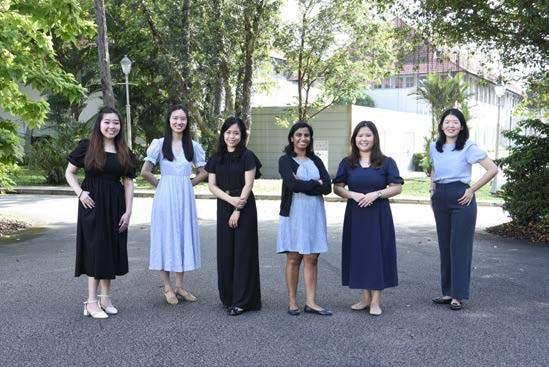
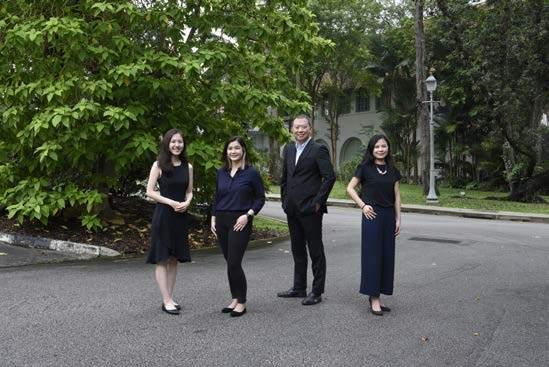
Social Lab Operations
From

to
Tan Gek Jee, Senior Associate Director ; Hong Gao Qiang, Senior Manager ; Anderson Tan Poh Lin, Management Assistant Officer ; Michelle Teo, Management Assistant Officer ; Derrick Ng, Management Assistant Officer ; Alicia Chong, Executive (Project Management) Wong Jun Hao, Management Assistant Officer; Tang Hwee Noy, Assistant Senior Manager ; Julie Tay, Management Assistant Officer Serene Tan, Executive (Data Management); Kendra Soh, Executive (Data Management)

OUR PEOPLE
From left to right: Ang Qi Jun, Executive; Koh En Lin, Research Assistant (Special Projects) Latasha Seow, Research Assistant (Special Projects) Cai Dewei, Senior Executive Liang Kaixin, Associate Director ; Muhammad Asyraf Bin Jamil, Executive
From left to right: Lam Leng Jen, Assistant Manager ; Sofia Binte Akram, Executive; Low Han-tzen, Senior Associate Director ; Joanna Koh, Manager
From left to right: Winnie Tan, Executive ; Jasmine Ng, Senior Executive ; Nur Zahidah Binti Mohd Nasir, Assistant Manager ; Tamil Vani d/o Gunasilan, Manager ; Grace Kwang, Executive ; Ong Si Ling, Senior Manager
Not in group photo: Nicolette Ong, Executive
Not in group photo Institute of Policy Studies REVISITINGS Celebrating 35 Years (1988–2023) 75 74
left
right:
A Network of Corporate Associates
Since 1992, IPS has fostered a growing network of Corporate Associates (CAs) whose contributions remain integral to the Institute’s expansion through the years, allowing the Institute to carry out its mission. There are currently over 80 CAs, including two Lifetime Patrons and 22 Lifetime Friends of IPS.
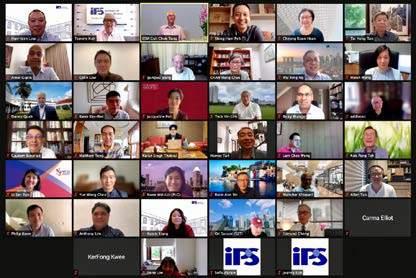
The CA Programme builds bonds between the business community and the Institute, with an active network of business leaders providing insights on policy issues through a range of viewpoints. The Programme facilitates these exchanges through regular meetings with key thought leaders and policymakers from both Singapore and abroad.
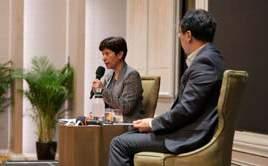
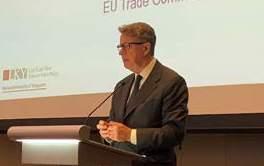
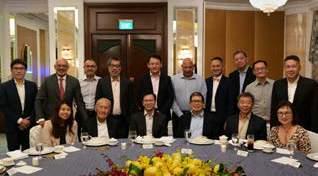
IPS organises about 12 to 14 of these events annually, which range from one-table lunches or dinners to larger breakfast or lunch dialogues.
Additionally, CAs are granted priority invitations to the full suite of IPS public events. They also receive INSIGHTS, which are curated bullet-point briefs of key takeaways from selected IPS events and research projects.
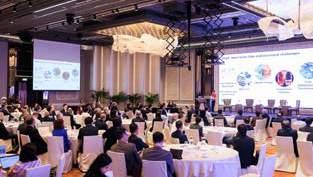

“The onset of the pandemic saw Singapore implementing its Circuit Breaker, which was a nationwide partial lockdown, on 7 April 2020. This, along with subsequent safe distancing measures, severely limited dining-in and gatherings to a handful of people.
The CA team responded quickly and organised the Programme’s first virtual session on 13 May 2020, with 20 attendees in a discussion with Dr Beh Swan Gin, then Chairman of EDB. Determined not to break the tradition of conducting our meetings over meals, we had a French restaurant in the Dempsey locale prepare and deliver a splendid fourcourse dinner to each participant’s home.
With that success, we went on to cater from an exquisite selection of restaurants serving food of various cuisines, from Chinese, Mod-Sin, French to Italian. Despite the logistical challenges, we delivered meals for larger events of up to 60 pax as well and received many a compliment from our guests.”


 - Mr Low Han-tzen, Senior Associate Director
- Mr Low Han-tzen, Senior Associate Director
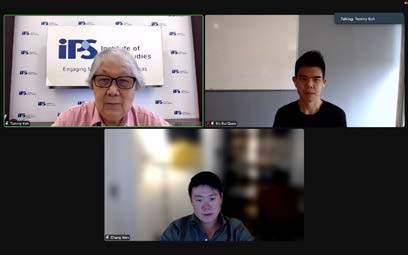
 Attendees at the One-table Dinner with Mr Lai Chung Han, Permanent Secretary at the Ministry of Education.
Many leaders from the business community were present at the Breakfast Dialogue with the Singapore Economic Development Board.
Prof Tommy Koh facilitating a discussion with Mr Lai Chang Wen (Ninja Van) and Mr Quek Siu Rui (Carousell Group) on the startup ecosystem in Singapore at the Pontiac Land-IPS Food for Thought Lunch.
Emeritus Senior Minister Mr Goh Chok Tong shared his thoughts and insights on Singapore’s politics with participants at the Pontiac Land-IPS Food for Thought Lunch.
Meals were curated and delivered to participants as part of the CA Programme’s virtual gatherings.
Lord Peter Mandelson, Co-founder and Chairman of public policy advisory firm Global Counsel and former European Trade Commissioner and British First Secretary of State, discussed the future of the United Kingdom after Brexit and its implications for companies in Asia.
Minister in the Prime Minister’s Office and Second Minister for Finance and National Development Ms Indranee Rajah in dialogue with IPS Corporate Associates on Singapore’s Budget.
Attendees at the One-table Dinner with Mr Lai Chung Han, Permanent Secretary at the Ministry of Education.
Many leaders from the business community were present at the Breakfast Dialogue with the Singapore Economic Development Board.
Prof Tommy Koh facilitating a discussion with Mr Lai Chang Wen (Ninja Van) and Mr Quek Siu Rui (Carousell Group) on the startup ecosystem in Singapore at the Pontiac Land-IPS Food for Thought Lunch.
Emeritus Senior Minister Mr Goh Chok Tong shared his thoughts and insights on Singapore’s politics with participants at the Pontiac Land-IPS Food for Thought Lunch.
Meals were curated and delivered to participants as part of the CA Programme’s virtual gatherings.
Lord Peter Mandelson, Co-founder and Chairman of public policy advisory firm Global Counsel and former European Trade Commissioner and British First Secretary of State, discussed the future of the United Kingdom after Brexit and its implications for companies in Asia.
Minister in the Prime Minister’s Office and Second Minister for Finance and National Development Ms Indranee Rajah in dialogue with IPS Corporate Associates on Singapore’s Budget.
A NETWORK OF CORPORATE ASSOCIATES Institute of Policy Studies REVISITINGS Celebrating 35 Years (1988–2023) 77 76
Thank You to Our Donors
We express our sincerest gratitude to our Corporate Associates and other donors for their generous contributions over the past 35 years. Their support has been integral to the Institute’s growth.
IPS Corporate Associates
Lifetime Patrons of IPS
Donors to IPS on the Occasion of our 35th Anniversary (as of 7 June 2023)
Kewalram Chanrai Group
Pontiac Land Group
United World College of South East Asia
UOB
Venture Corporation Limited
Wilmar International Limited
BGC Group Pte Ltd
BinjaiTree
Building and Construction Authority
Changi Airport Group
City Developments Limited
EnGro Corporation Limited
Institute of Technical Education
Keppel Corporation
Khong Guan Biscuit Factory (S) Pte Ltd
KPMG Services Pte. Ltd.
LinkedIn
Maritime and Port Authority of Singapore
Monetary Authority of Singapore
Nanyang Polytechnic
National University of Singapore
OUE Limited
PSA International
Sentosa Development Corporation
Shangri-La Hotel Limited
Singapore Polytechnic
Singapore Pools (Private) Limited
Surbana Jurong
Thakral Group
Zuellig Initiatives Philanthropiques
The Ngee Ann Kongsi
The Ngee Ann Kongsi committed S$2.94 million to The Ngee Ann Kongsi-IPS Research Fund in 2021.
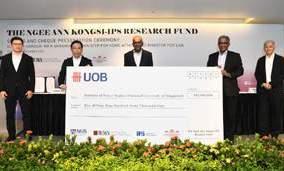
The gift, which will be made over three years, will support IPS Policy Laboratory and the following projects during the term of the gift:
• The Ngee Ann Kongsi Community Fellowship, which allows community leaders and change-makers to test-bed innovative interventions or implement community-based participatory research projects that can contribute to community development or social change.
• Reimagining Singapore 2030, a scenario-planning exercise on how Singapore will achieve happiness, prosperity and progress in 2030 and beyond.
• IPS’ annual flagship conference Singapore Perspectives (2022, 2023 and 2024).
• The Ngee Ann Kongsi-IPS Panel Study on the Impact, Effects and Expectations of Singaporeans in Low-Income Households in Post-COVID-19 Singapore.
• The Ngee Ann Kongsi-IPS Citizens’ Panel Series, through which citizens from all walks of life can share their views on current policies, culminating in a set of recommendations to policymakers.
The signing of the gift agreement and cheque presentation ceremony took place on 7 December 2021, with Minister for Home Affairs and Law Mr K Shanmugam gracing the event as the guest-of-honour.
The Silent Foundation

In 2022, The Silent Foundation pledged a gift of S$2.5 million to The Silent Foundation-IPS Racial and Religious Harmony Fund.
The gift, which will be made over five years, will support the following programmes:
• IPS Programme on Race, Religion, and Intergroup Cohesion (IPS RRIC)
• IPS Thought Leadership Forum on Racial and Religious Harmony
Minister for Culture, Community and Youth and Second Minister for Law Mr Edwin Tong graced the cheque ceremony on 18 October 2022.
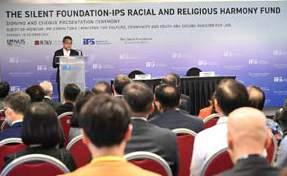
THANK YOU TO OUR DONORS
Institute of Policy Studies REVISITINGS Celebrating 35 Years (1988–2023) 79 78
Lifetime Friends of IPS
CapitaLand Investment Limited
Citi Singapore
EnGro Corporation Limited
ExxonMobil Asia Pacific Pte Ltd
EY
Fraser and Neave, Limited
G. K. Goh Holdings Limited
GIC Private Limited
Kewalram Chanrai Group
M1 Limited
NTUC Enterprise Co-operative Limited
Friends of IPS
Acclaim Insurance Brokers Pte Ltd
Amansa Capital Pte Ltd
Applied Materials South East Asia Pte Ltd
AWP Pte Ltd
Bank of Singapore Limited
Bank Pictet & Cie (Asia) Ltd
Banyan Tree Holdings Limited
BlackRock Singapore
Brisk Capital Advisors Pte Ltd
Centurion Corporation Limited
Changi Airport Group
Chevron
City Developments Limited
DBS Bank Ltd
Deloitte Singapore
DP Architects Pte Ltd
Economic Development Board
Energy Market Authority
Enterprise Singapore
Eu Yan Sang International Ltd
Global Counsel
Goh Foundation Limited
Huawei International Pte. Ltd.
Income Insurance Limited
iShine Cloud Limited
Jardine Cycle & Carriage Limited
Pontiac Land Group
PwC Singapore
Shell Companies in Singapore
Singapore Pools (Private) Limited
Singapore Telecommunications Limited
Tan Ean Kiam Foundation
United World College of South East Asia
UOB
Venture Corporation Limited
Wilmar International Limited
Wing Tai Holdings Limited
JTC Corporation
Keppel Corporation
Khong Guan Biscuit Factory (S) Pte Ltd
KPMG Services Pte. Ltd.
Mediacorp Pte Ltd
Nikko Asset Management Asia Ltd
Ocean Link Shipping Pte Ltd
OUE Limited
Oversea-Chinese Banking Corporation Limited
PSA International
Raffles Medical Group
Resorts World at Sentosa Pte Ltd
Rolls-Royce Singapore Pte Ltd
Schroder Investment Management (Singapore) Ltd
Sea Limited
Shangri-La Hotel Limited
Singapore Airlines Ltd
Singapore Institute of Technology
Singapore Land Authority
Singapore Tourism Board
SPH Media Trust
Temasek Holdings Pte Ltd
Thakral Group
Urban Redevelopment Authority
WongPartnership LLP
Zuellig Initiatives Philanthropiques
The IPS Public Affairs team would like to thank all IPS staff for their contributions to this publication. Compiled by: Asyraf Jamil, Liang Kaixin, Cai Dewei and Koh En Lin Design and Photography by: Oxygen Studio Designs Pte Ltd Visit our website at lkyspp.nus.edu.sg/ips Connect with us @IPSLKYSPP @IPS_sg @IPS_sg @ips_sg @ipsspore
Celebrating 35 Years (1988–2023) 80































 Tommy Koh Special Adviser Director (1990–1997), (2000–2004)
Tommy Koh Special Adviser Director (1990–1997), (2000–2004)




























 - Dr Justin Lee, Senior Research Fellow, Head of IPS Policy Lab
- Dr Justin Lee, Senior Research Fellow, Head of IPS Policy Lab
 Speakers at the 2021 TNPS conference included Minister for National Development and Minister-in-charge of Social Services Integration Mr Desmond Lee.
Speakers at the 2022 TNPS conference included (from left) Mr Ang Hin Kee, CEO of the Singapore National Co-operative Federation (SNCF), Mr Lewin Low, Project Consultant at Solve n+1, Ms Rachel Loh, Senior Social Worker at the Fei Yue Community Services, Ms Denise Liu and Dr Justin Lee.
As part of the TNPS programme, Dr Justin Lee and a group of participants from the non-profit sector embarked on a study trip to Baltimore, USA to learn from several co-op businesses based there.
Participants at the 2021 TNPS conference, held fully online.
Speakers at the 2021 TNPS conference included Minister for National Development and Minister-in-charge of Social Services Integration Mr Desmond Lee.
Speakers at the 2022 TNPS conference included (from left) Mr Ang Hin Kee, CEO of the Singapore National Co-operative Federation (SNCF), Mr Lewin Low, Project Consultant at Solve n+1, Ms Rachel Loh, Senior Social Worker at the Fei Yue Community Services, Ms Denise Liu and Dr Justin Lee.
As part of the TNPS programme, Dr Justin Lee and a group of participants from the non-profit sector embarked on a study trip to Baltimore, USA to learn from several co-op businesses based there.
Participants at the 2021 TNPS conference, held fully online.






















































































 and Pandemics
Singapore’s Response to COVID-19 (2021) by Woo Jun Jie.
Capital
Singapore:
of Network Diversity (2020) by Vincent Chua, Gillian Koh, Tan Ern Ser and Drew Shih.
Tay.
and Melvin Tay.
and Pandemics
Singapore’s Response to COVID-19 (2021) by Woo Jun Jie.
Capital
Singapore:
of Network Diversity (2020) by Vincent Chua, Gillian Koh, Tan Ern Ser and Drew Shih.
Tay.
and Melvin Tay.












































































 - Mr Low Han-tzen, Senior Associate Director
- Mr Low Han-tzen, Senior Associate Director

 Attendees at the One-table Dinner with Mr Lai Chung Han, Permanent Secretary at the Ministry of Education.
Many leaders from the business community were present at the Breakfast Dialogue with the Singapore Economic Development Board.
Prof Tommy Koh facilitating a discussion with Mr Lai Chang Wen (Ninja Van) and Mr Quek Siu Rui (Carousell Group) on the startup ecosystem in Singapore at the Pontiac Land-IPS Food for Thought Lunch.
Emeritus Senior Minister Mr Goh Chok Tong shared his thoughts and insights on Singapore’s politics with participants at the Pontiac Land-IPS Food for Thought Lunch.
Meals were curated and delivered to participants as part of the CA Programme’s virtual gatherings.
Lord Peter Mandelson, Co-founder and Chairman of public policy advisory firm Global Counsel and former European Trade Commissioner and British First Secretary of State, discussed the future of the United Kingdom after Brexit and its implications for companies in Asia.
Minister in the Prime Minister’s Office and Second Minister for Finance and National Development Ms Indranee Rajah in dialogue with IPS Corporate Associates on Singapore’s Budget.
Attendees at the One-table Dinner with Mr Lai Chung Han, Permanent Secretary at the Ministry of Education.
Many leaders from the business community were present at the Breakfast Dialogue with the Singapore Economic Development Board.
Prof Tommy Koh facilitating a discussion with Mr Lai Chang Wen (Ninja Van) and Mr Quek Siu Rui (Carousell Group) on the startup ecosystem in Singapore at the Pontiac Land-IPS Food for Thought Lunch.
Emeritus Senior Minister Mr Goh Chok Tong shared his thoughts and insights on Singapore’s politics with participants at the Pontiac Land-IPS Food for Thought Lunch.
Meals were curated and delivered to participants as part of the CA Programme’s virtual gatherings.
Lord Peter Mandelson, Co-founder and Chairman of public policy advisory firm Global Counsel and former European Trade Commissioner and British First Secretary of State, discussed the future of the United Kingdom after Brexit and its implications for companies in Asia.
Minister in the Prime Minister’s Office and Second Minister for Finance and National Development Ms Indranee Rajah in dialogue with IPS Corporate Associates on Singapore’s Budget.


